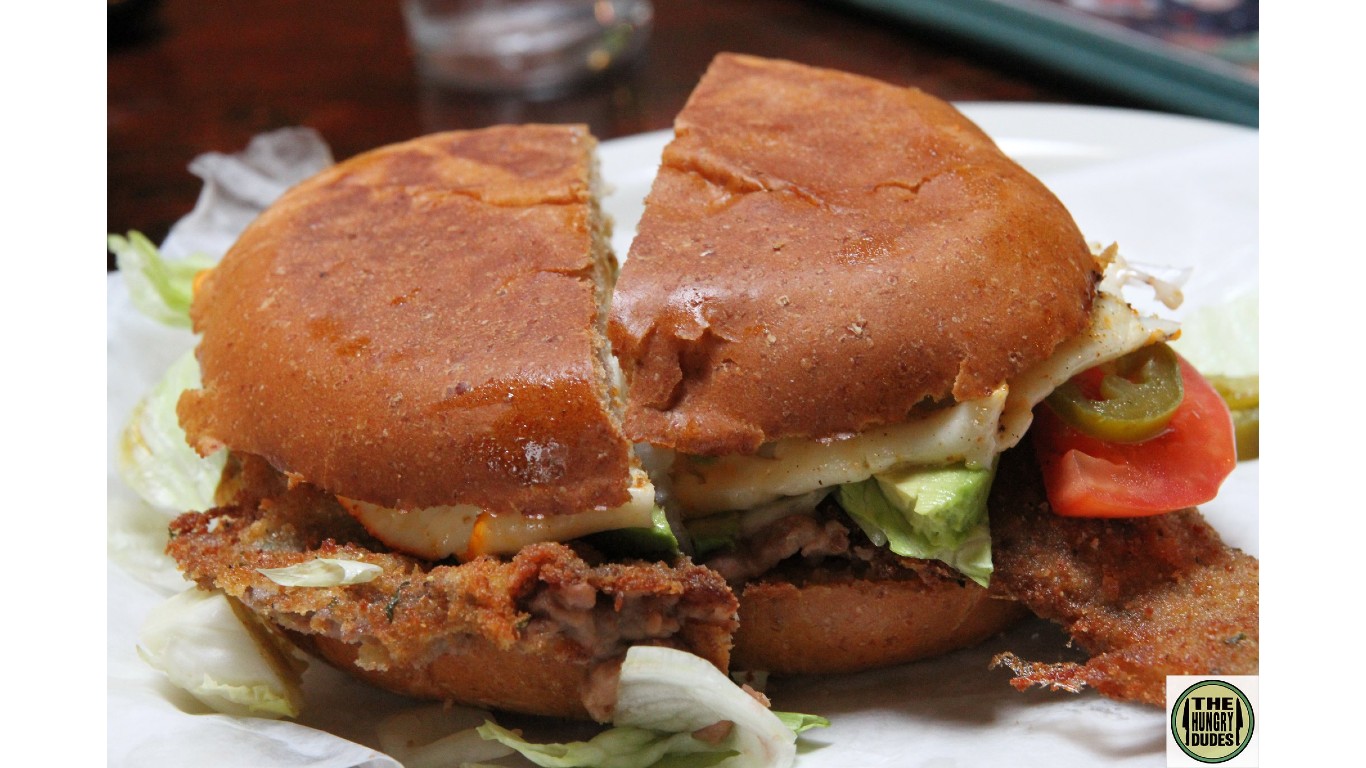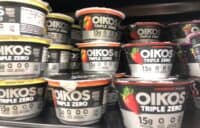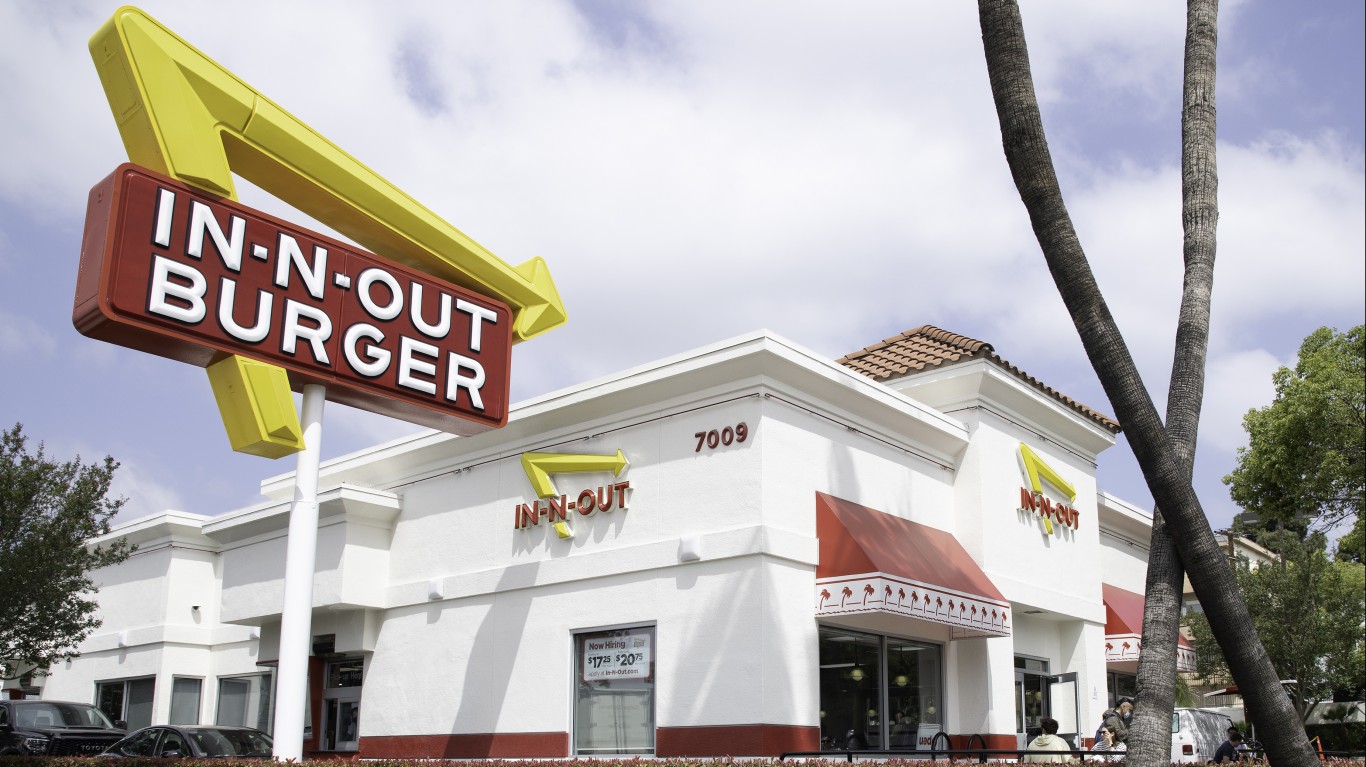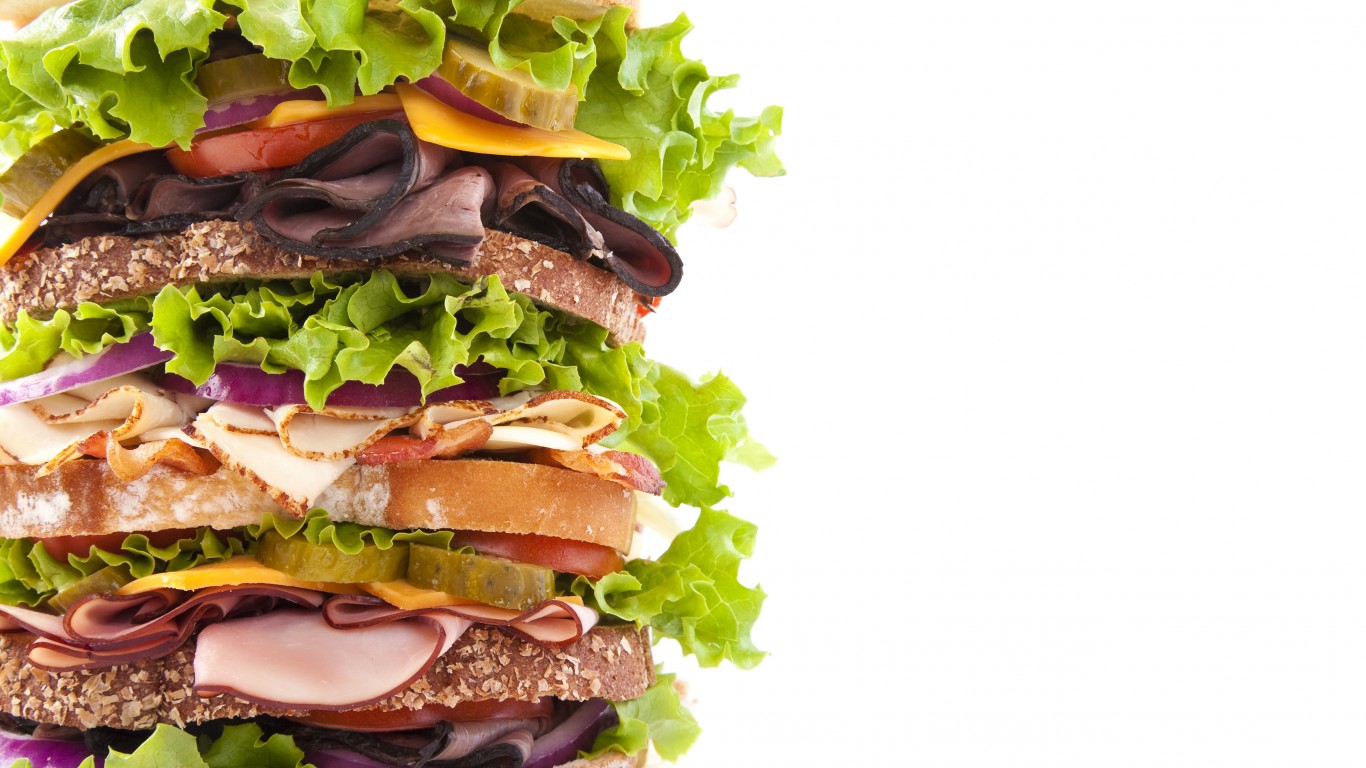
Few foods are as versatile or as universally beloved as the sandwich. Whether it’s a simple school lunch of peanut butter and jelly on white bread or a gut-busting Philly cheesesteak oozing Cheez Whiz, there’s a sandwich for every mood and every meal. And we’ve put together a list of 30 sandwiches that are the most iconic.
So what, exactly, is a sandwich? The most simple definition is “anything between two slices of bread,” but it’s a little more complicated than that. An ungodly amount of ink has been spilled on an asinine debate as to whether or not burgers and hot dogs are sandwiches, and we’re not about to wade into those waters. (Yes, they’re sandwiches; they’re meat inside bread.) But for today’s purposes, we’ve left them off the list and are instead focusing on the sandwiches that remain blissfully controversy-free. All have just two things in common: bread is always involved, and they’re all undeniably delicious. (These are America’s favorite sandwiches.)
Click here to see America’s most iconic sandwiches
As you travel across America, you’ll discover that there are countless regional sandwiches to discover, like the loosemeat, or tavern sandwich, which is made with seasoned ground beef and popular across the Midwest. (This is the best local sandwich to try in every state.)
Read on to learn all about the 30 most iconic American sandwiches. Some are purely American inventions, some were inspired by the country’s long history of welcoming immigrants from around the globe, and some are so universal that it’s hard to imagine a time in which they didn’t exist. And if there are any sandwiches on this list that you’ve never tried, we suggest you add them to your bucket list.
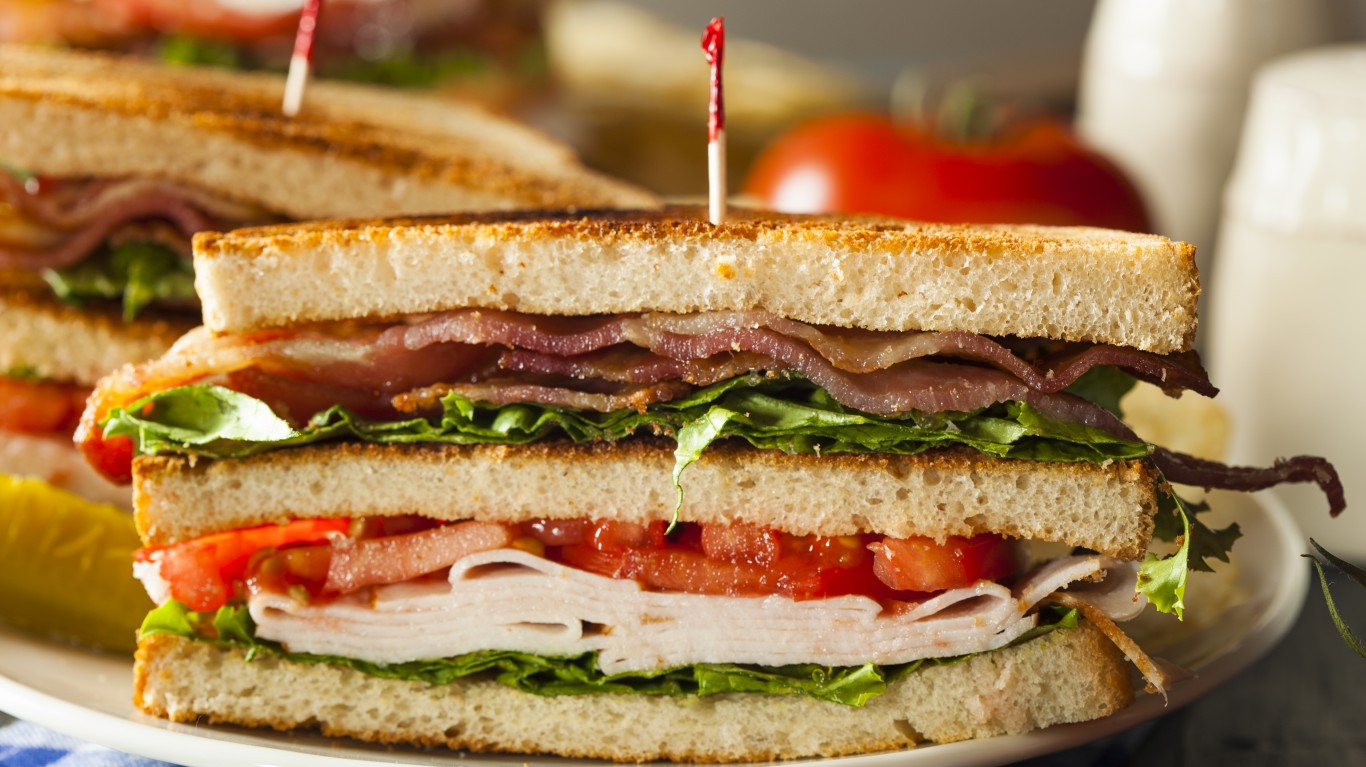
1. Club
A staple of hotel room-service menus the world over, the club sandwich is a triple-decker that’s traditionally made with three layers of white toast stacked with bacon, lettuce, tomato, and turkey, with mayo as a condiment. Some variations will add on cheese or egg or a different deli meat like ham or roast beef, but in general the structure remains the same. Like most sandwiches, its origin remains up for debate, but most agree that it was invented in the 1880s at New York City’s Union Club.
[in-text-ad]
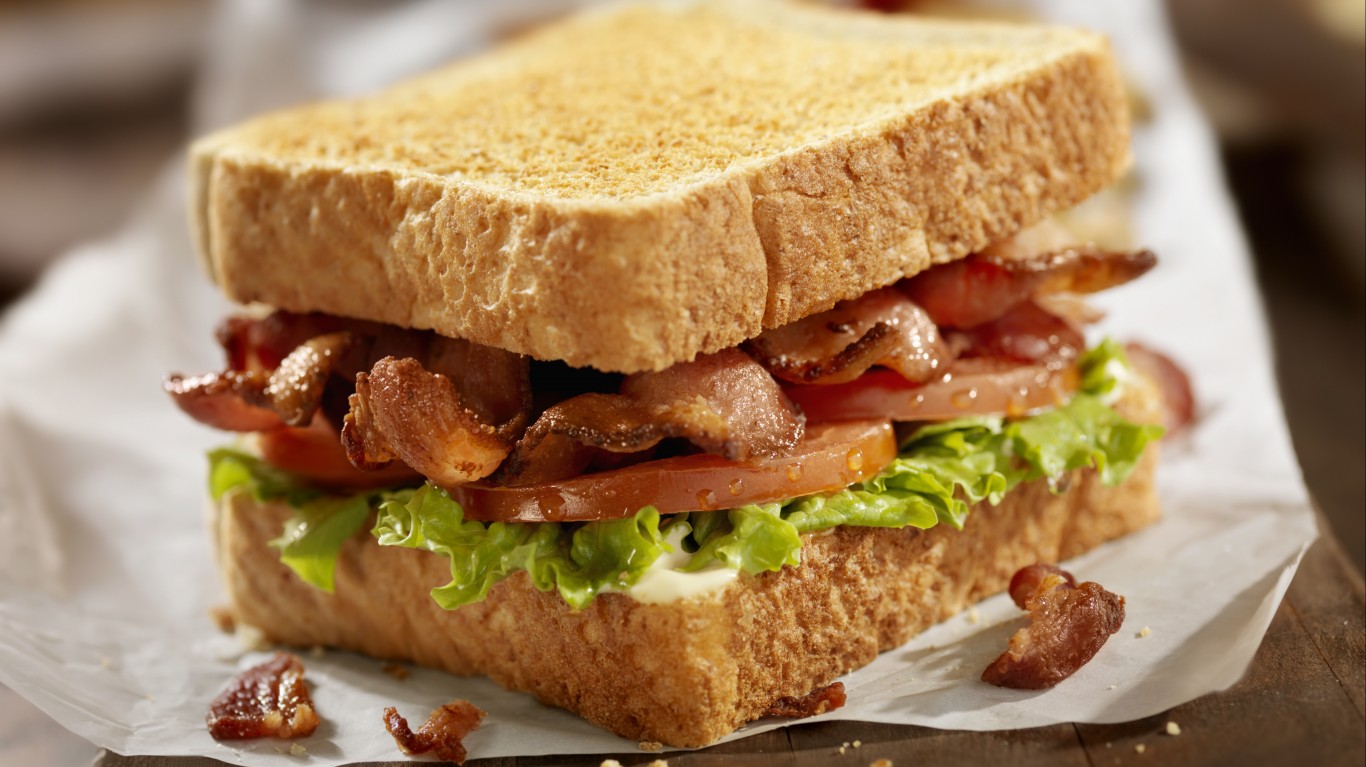
2. BLT
The best sandwiches are a perfect alchemy of ingredients, with the end result being better than the sum of its parts. The BLT is the perfect example: it’s just bacon, lettuce, and tomato (and sometimes a schmear of mayo) on toast, but it’s somehow also one of the most delicious foods known to man. This is one sandwich where the quality of the ingredients really matters: If you have access to a fresh ripe summer tomato, crisp lettuce, and smoky artisan bacon, this is the sandwich for you.
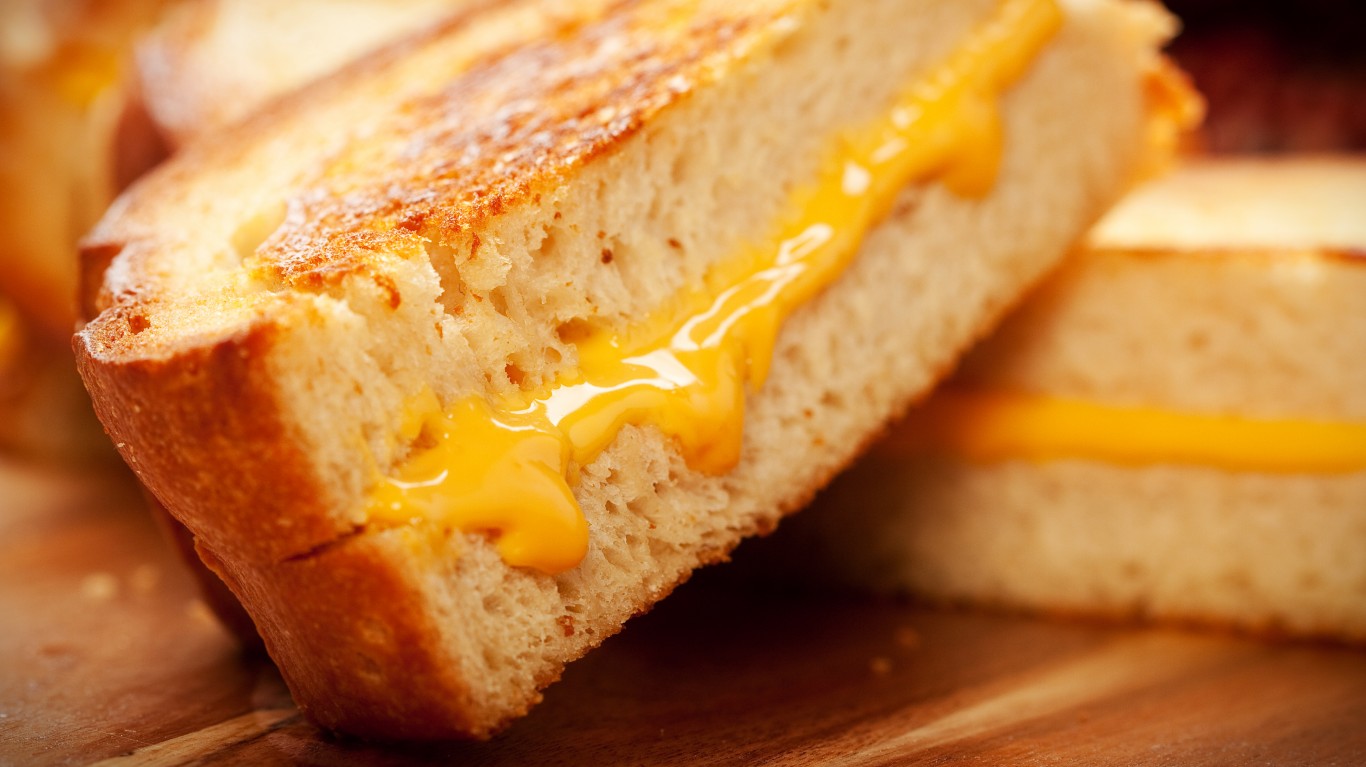
3. Grilled cheese
Few things taste like childhood more than a crisp grilled cheese sandwich, oozing melty American cheese. It’s simple and perfect, and open to serious interpretation. Whether you’re a purist who prefers to keep it classic with white bread, Kraft singles, and butter or like to get creative with artisanal cheeses and cheffy add-ins (truffle oil, anyone?), you really can’t go wrong.
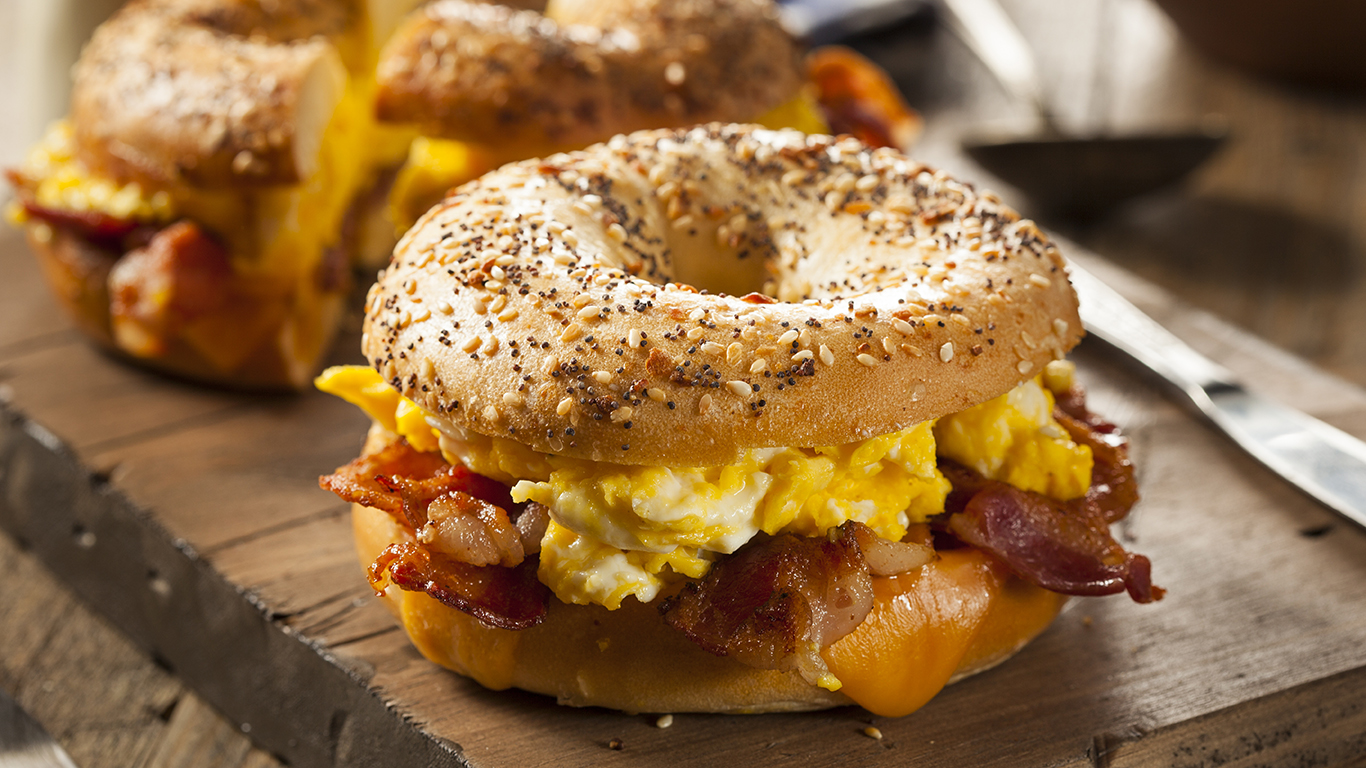
4. Breakfast sandwich
Ah, the breakfast sandwich. A New York City staple, it’s usually loaded with bacon, egg, and cheese, typically on a kaiser roll or bagel, but the meat option leaves plenty of room for creativity (ham and breakfast sausage are popular additions). There are also plenty of regional variations, like Taylor ham (also called pork roll) in New Jersey, scrapple in the Mid-Atlantic, and goetta in the Cincinnati area. The pro move? Add in a crisp hash brown.
[in-text-ad-2]

5. Lox and cream cheese on a bagel
Another NYC staple, a bagel with lox and cream cheese, with a cup of coffee on the side, is the perfect way to start your day (or to chase away a hangover). It’s usually eaten open-faced, but can easily be closed up to eat on the go. Most bagel shops allow you to customize yours with various cream cheese flavors, but we like to keep it “plain” and just kick it up with some red onion and capers.
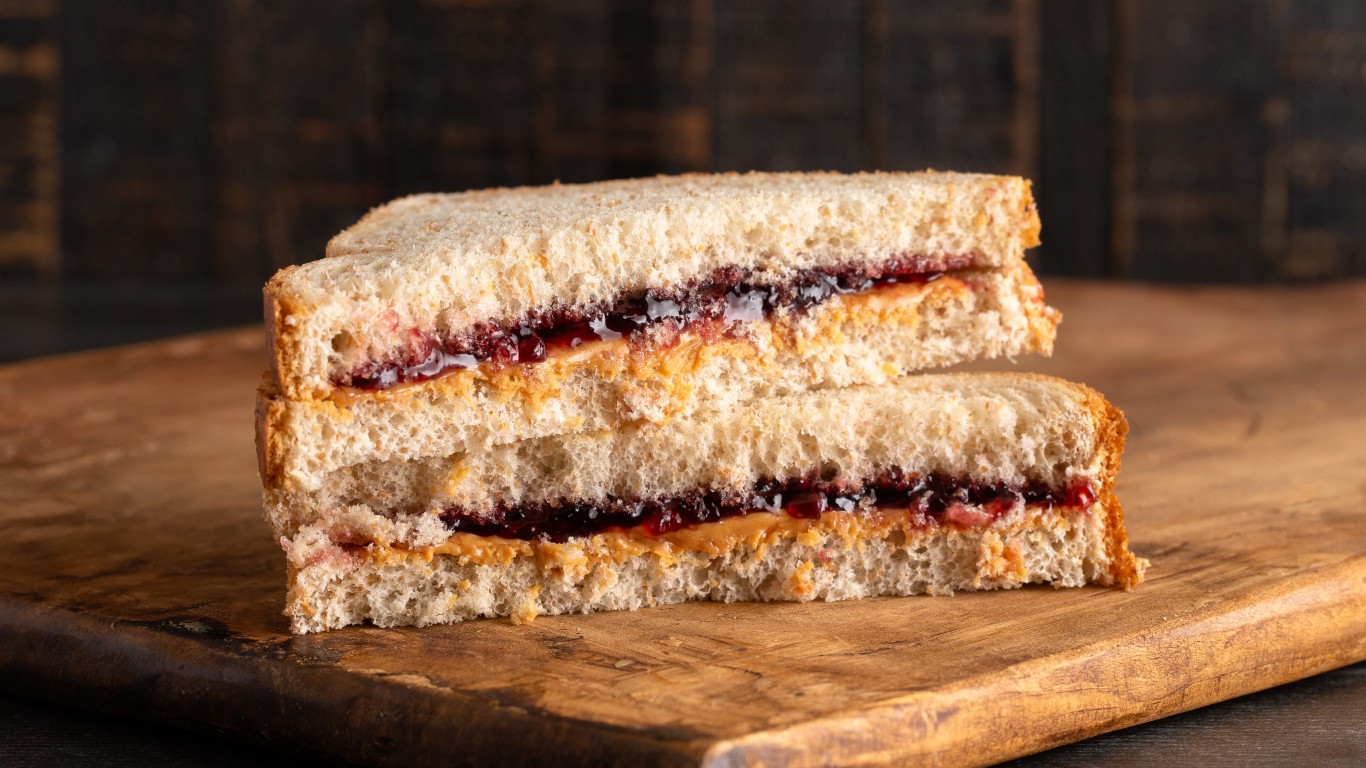
6. Peanut butter and jelly
What foods go together better than peanut butter and jelly? Not only is the classic, timeless PB&J super easy to make with staples just about everyone has on hand (and is one of the first things most kids learn how to “cook”), it’s delicious and just about impossible to mess up. Crunchy or smooth? Strawberry or grape? The choice is yours. Fun fact: April 2 is National Peanut Butter and Jelly Day.
[in-text-ad]
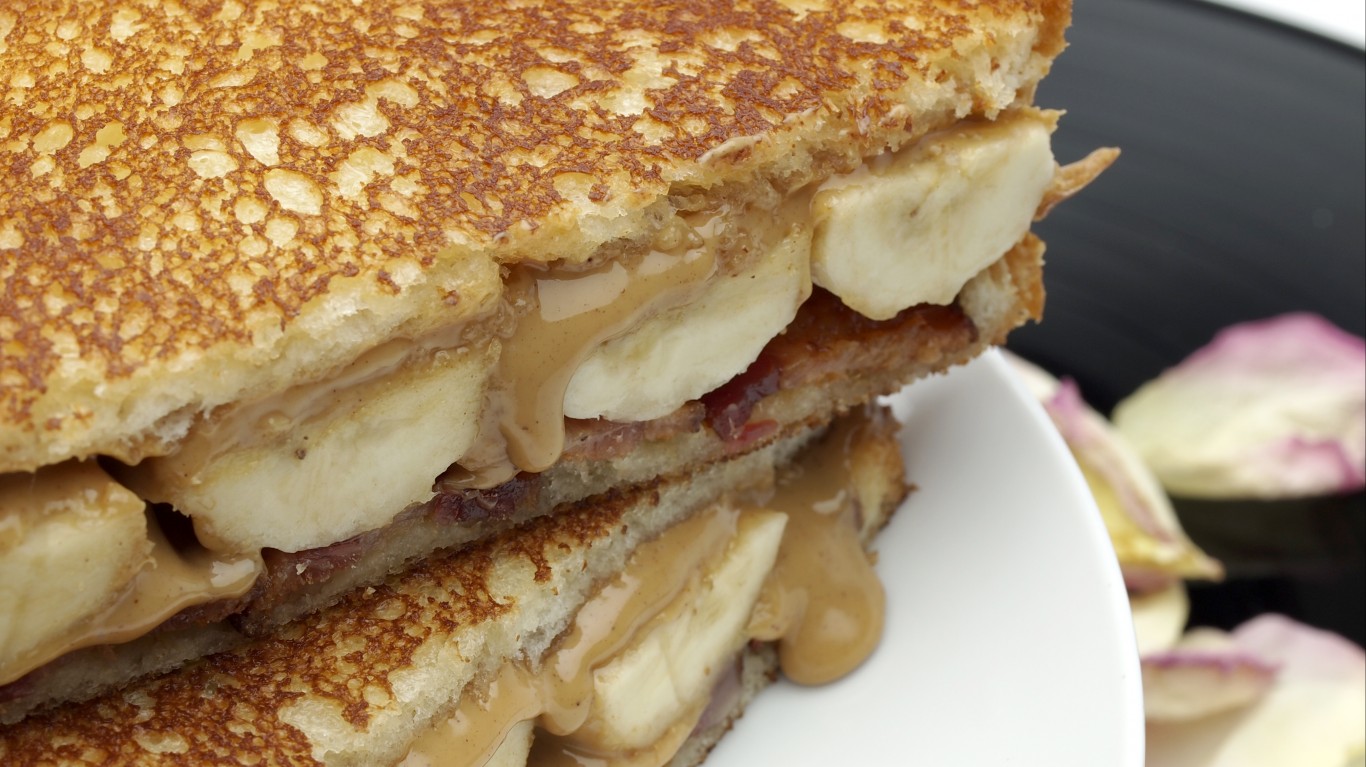
7. The Elvis
This sandwich was popularized by none other than the King of Rock & Roll himself, Elvis Presley. His favorite sandwich, The Elvis is made with a combination of peanut butter and banana (and occasionally crispy bacon) on toast. The banana can be sliced, mashed, or caramelized, and it can be browned in a frying pan with butter or bacon fat. Some variations also include honey or jelly. It may sound crazy, but a peanut butter and banana sandwich is actually insanely delicious.
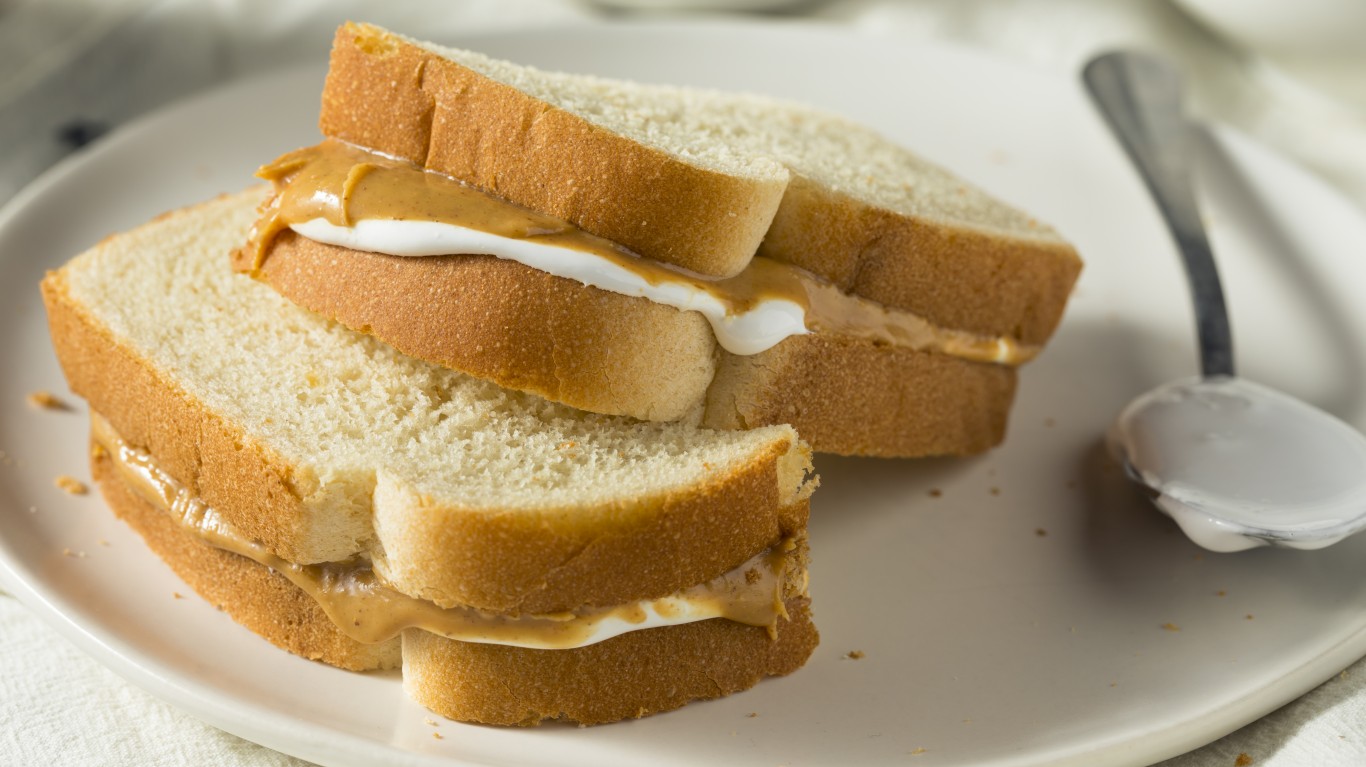
8. Fluffernutter
Is it a sandwich? Is it dessert? It’s both. The fluffernutter appeared in the early years of the 20th century, shortly after the invention of one of its two primary ingredients, marshmallow creme, in Massachusetts. The other main component, of course, is peanut butter, and it’s traditionally served on white bread. Other variations add bananas, Nutella, and/or bacon. The fluffernutter remains hugely popular in New England, and it’s even been proposed as Massachusetts’s official state sandwich.
9. Monte Cristo
An American spin on the French croque monsieur, the Monte Cristo exploded onto the scene in the late 1960s, when it was added to the menu at the New Orleans-themed Blue Bayou restaurant at Disneyland in California. It starts out as a simple ham and cheese sandwich, but it takes a sharp turn from there: it’s battered and either pan-fried or deep-fried, and traditionally served topped with powdered sugar, with maple syrup or preserves on the side. It’s a sweet-savory combo that works extremely well, and it’s just decadent enough.
[in-text-ad-2]
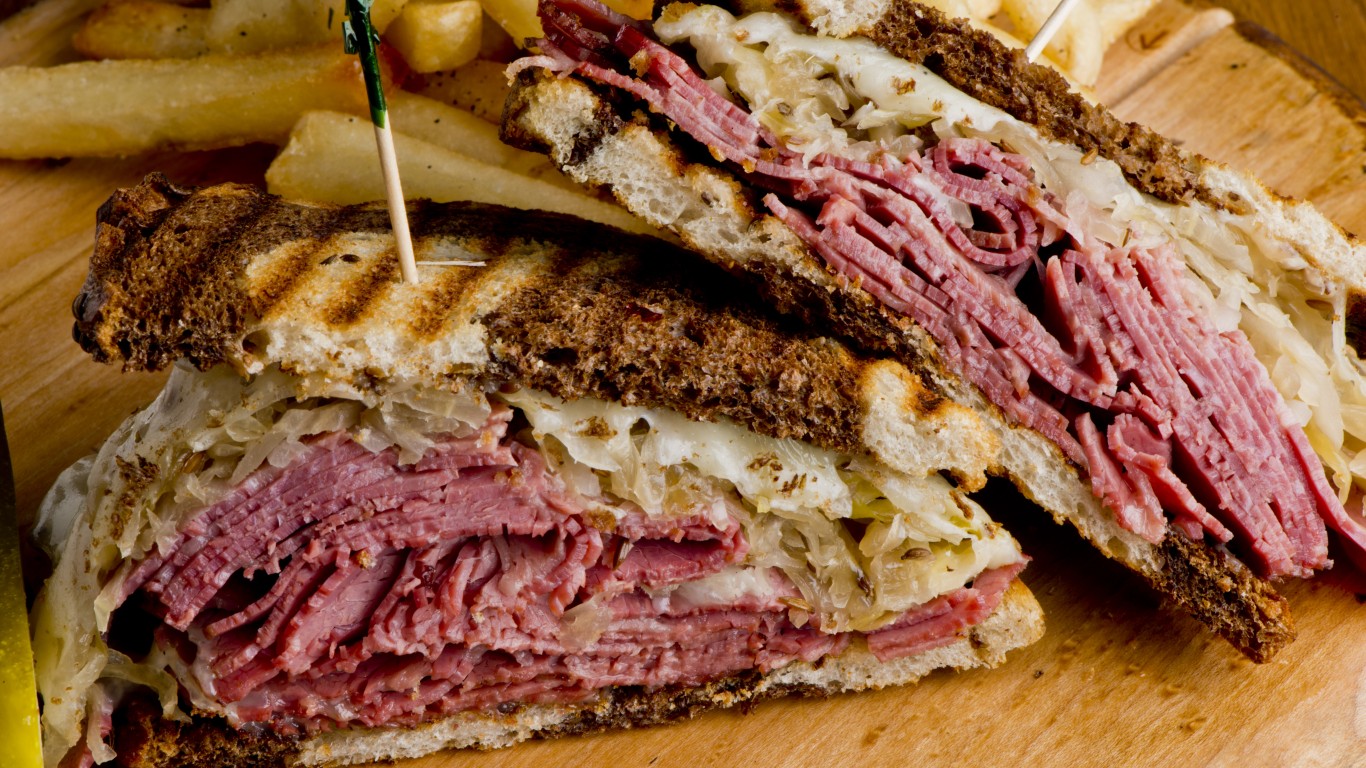
10. Reuben
Legend has it that the Reuben sandwich was invented at Omaha’s Blackstone Hotel at some point in the ’20s or early ’30s, when a guest named Reuben Kulakofsky asked for a sandwich during his weekly poker game there. The end result — corned beef, melted Swiss cheese, sauerkraut, and Russian dressing on rye — became insanely popular when added to the Blackstone’s lunch menu, and its popularity took off from there. Today it’s a staple on Jewish deli menus (even though it’s not kosher because it combines meat and dairy), and variations sub in ingredients including pastrami, Thousand Island dressing, and coleslaw.
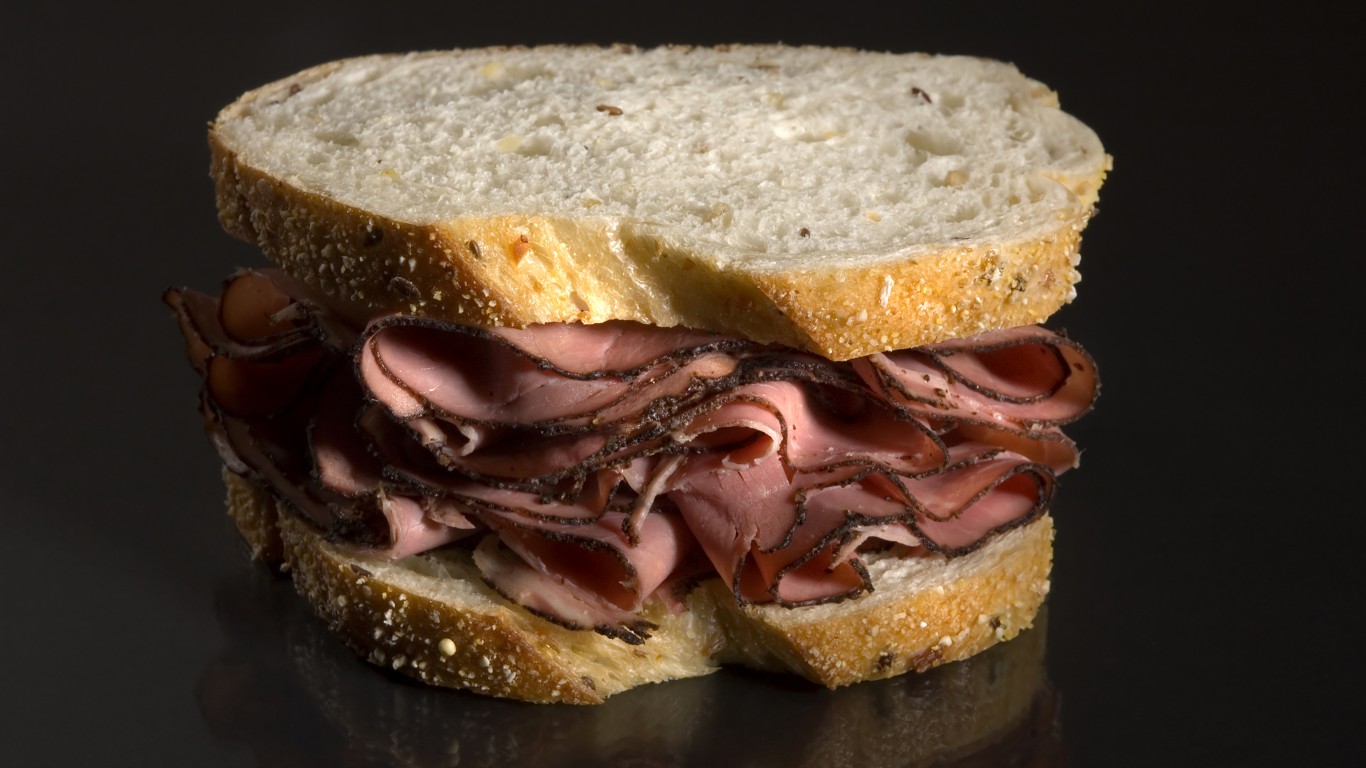
11. Pastrami on rye
Any Jewish deli worth its salt needs to excel at making one particular sandwich: pastrami on rye bread. Pastrami is made by brining, smoking, and steaming beef brisket (or, more traditionally, a cut called the navel), then slicing it to order and serving it up hot. Good-quality pastrami should be able to stand on its own without any augmentation, but a schmear of deli mustard doesn’t hurt.
[in-text-ad]
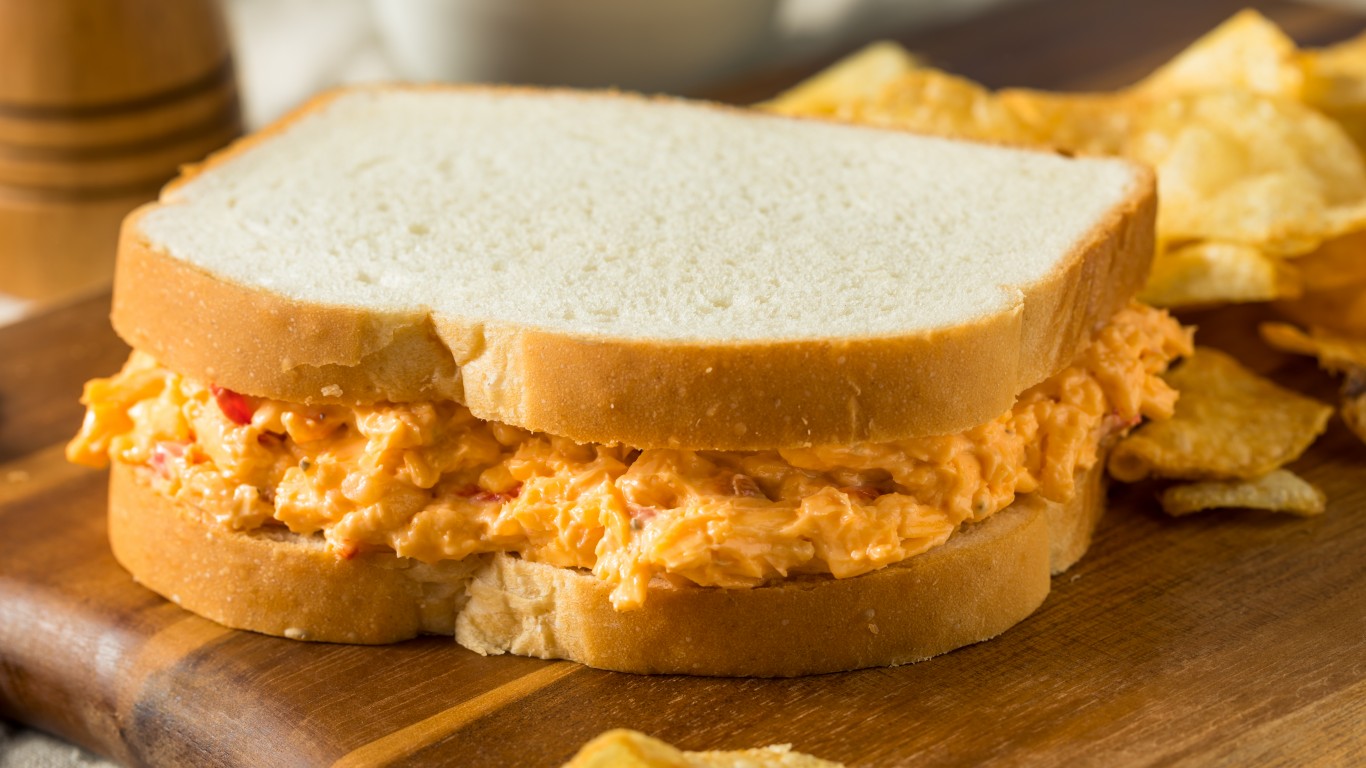
12. Pimento cheese
A hallmark of Southern cuisine, pimento cheese is, at its most basic, a spread made by combining cheddar cheese, mayo, and pimentos (little red pickled peppers also called cherry peppers). Every Southern chef seems to have their own variation on it; popular additions include Velveeta, cream cheese, hot sauce, Worcestershire, and paprika. You’ll see it simply served with crackers or even dolloped atop a burger, but when sandwiched between two fluffy slices of white bread it makes for a perfect lunch.
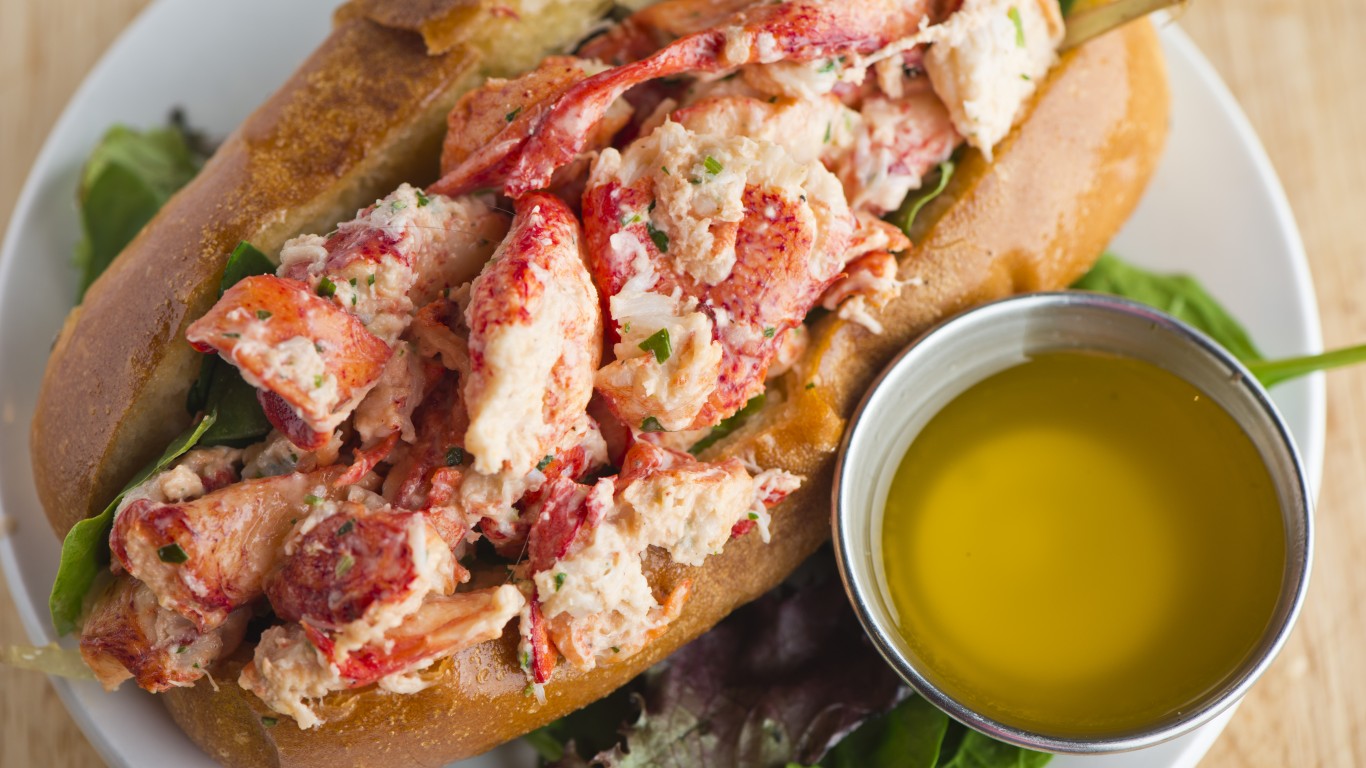
13. Lobster roll
Another regional specialty, the lobster roll is one of the hallmarks of Northeastern cuisine. It usually comes in two primary versions: Maine-style, in which the lobster is cold and tossed with mayo; and Connecticut- or Rhode Island-style, which is served warm with butter. Both tuck the lobster meat into a split-top hot dog bun (or sometimes a round burger bun in Connecticut), which is usually griddled with butter. It’s not cheap and some have argued that turning a delicacy as expensive as a lobster into a sandwich is below its station, but if you ever find yourself sitting on the rocky shores of Maine with a fresh lobster roll in your hand, it’s truly like biting into a little piece of heaven.
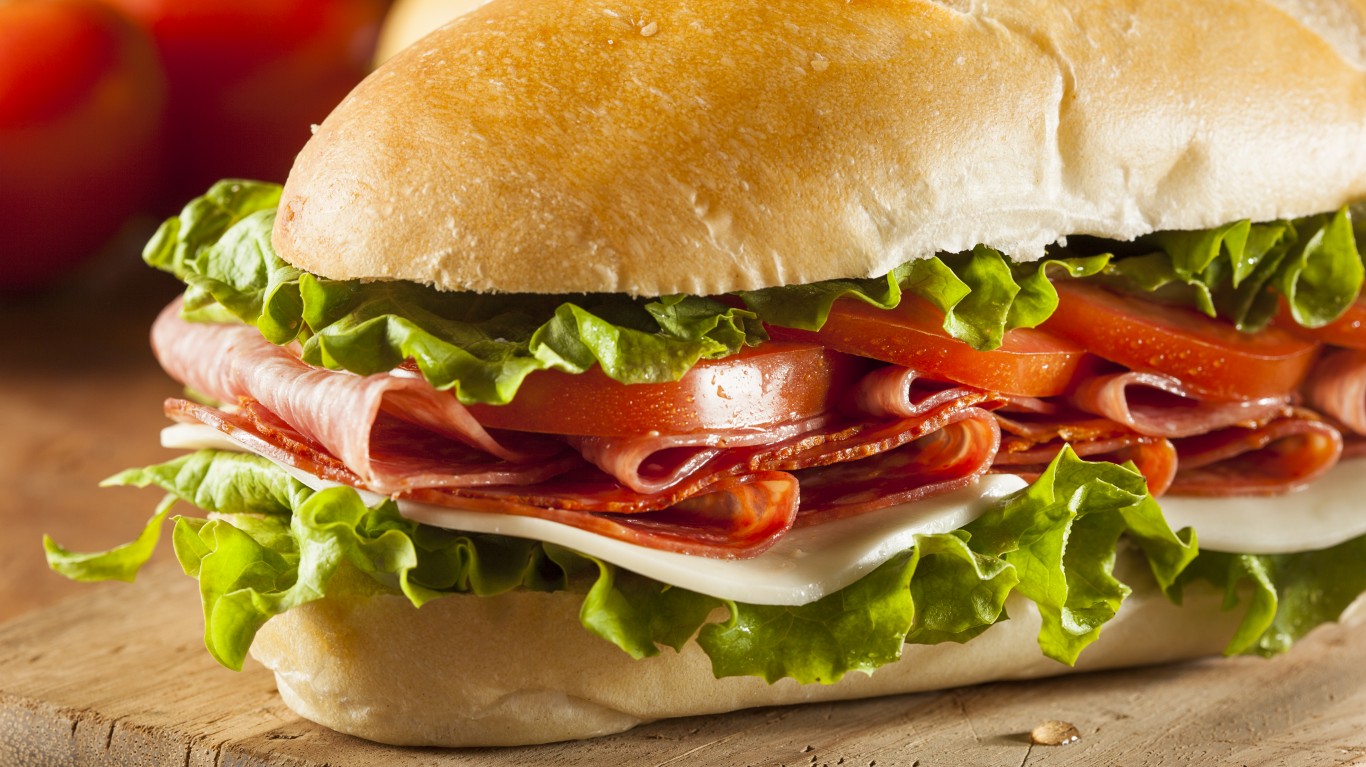
14. Italian sub (hoagie, grinder, etc.)
Call it a sub, a hero, a hoagie, or a grinder, there’s no denying that the Italian sub is anything other than wildly delicious. A staple of Italian delis nationwide, the sub has countless variations, but they all include a wide variety of Italian meats like salami, capicola, mortadella, and ham, along with cheese (usually provolone), lettuce, tomato, onion, optional additional veggies like pickled banana peppers, and a squirt of oil & vinegar to finish it off, perhaps with a sprinkling of Italian herbs.
[in-text-ad-2]
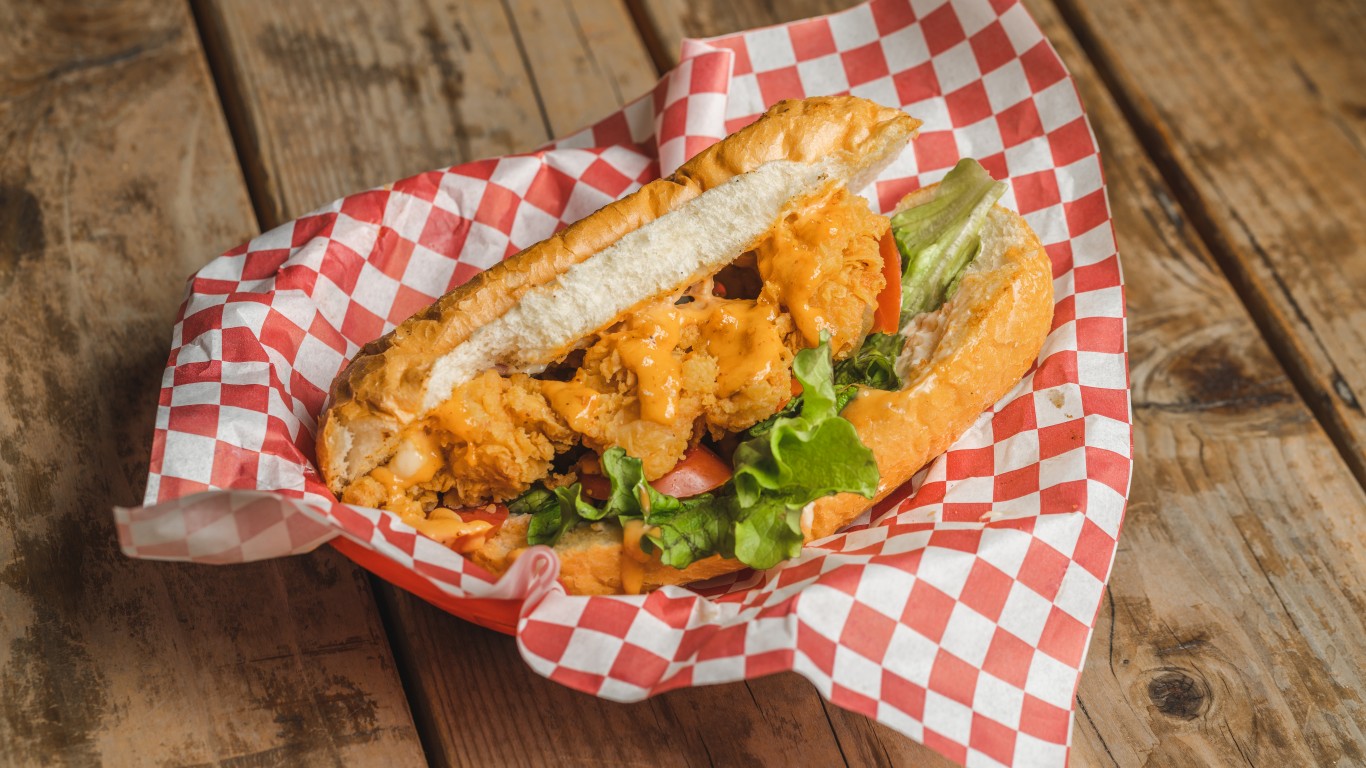
15. Po’boy
The po’boy is one of New Orleans’ signature foods. As the story goes, back in 1929, during a four-month strike against the city’s streetcar company, husband and wife Benny and Clovis Martin fed the strikers free sandwiches; the term was coined when they referred to the strikers as “poor boys” coming in to eat. Nowadays, the po’boy can be found at countless restaurants and sandwich shops throughout the Big Easy. It always starts with a soft, crusty loaf of French bread (ideally from local bakery Leidenheimer’s), and there are countless filling options, from fried shrimp, crawfish, and oysters to roast beef, ham, and sausage. Order it “dressed” and it’ll come topped with lettuce, tomato, pickles, and mayo.
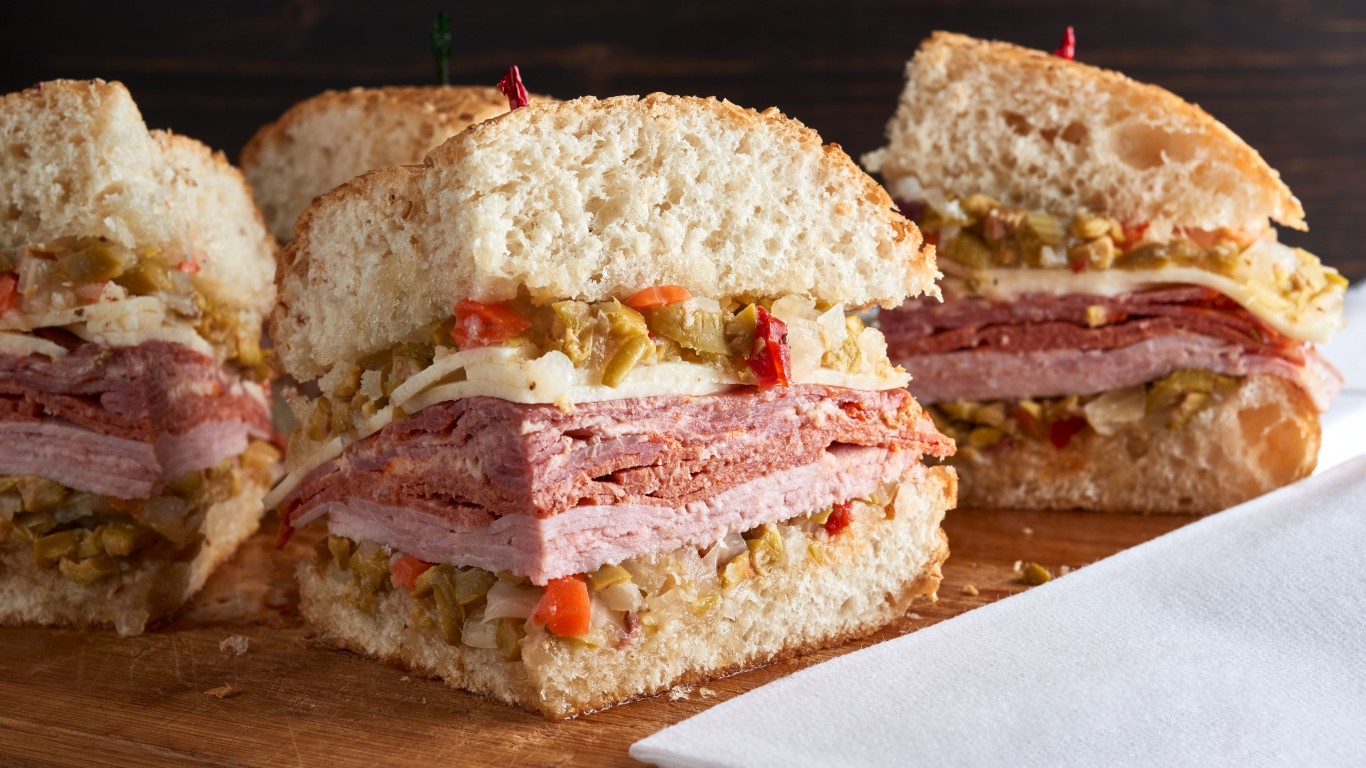
16. Muffuletta
New Orleans’ other signature sandwich, the muffuletta is said to have been invented at Central Grocery by Sicilian immigrant Salvatore Lupo to feed the Italian immigrants working at the nearby French Market. Central Grocery still makes the definitive version, though plenty of other places around town put their own spin on it: it starts with a large round loaf of Sicilian sesame bread, and it’s layered with salami, ham, mortadella, provolone, Swiss, and a tangy salad made with chopped olives, pickled vegetables, garlic, and olive oil. There’s nothing else quite like it, and it’s a must-try for any New Orleans visitor.
[in-text-ad]

17. Dagwood
If you’ve spent any time reading the comic strip “Blondie,” then you’ve probably seen the strip’s bumbling (and food-crazed) protagonist, Dagwood Bumstead, concoct an overstuffed sandwich made with whatever he could scrounge up from the fridge. And that’s basically what a Dagwood sandwich is: a wide variety of cold cuts, cheeses, vegetables, and condiments, along with a couple extra slices of bread for good measure. The only rule? It has to be comically large.
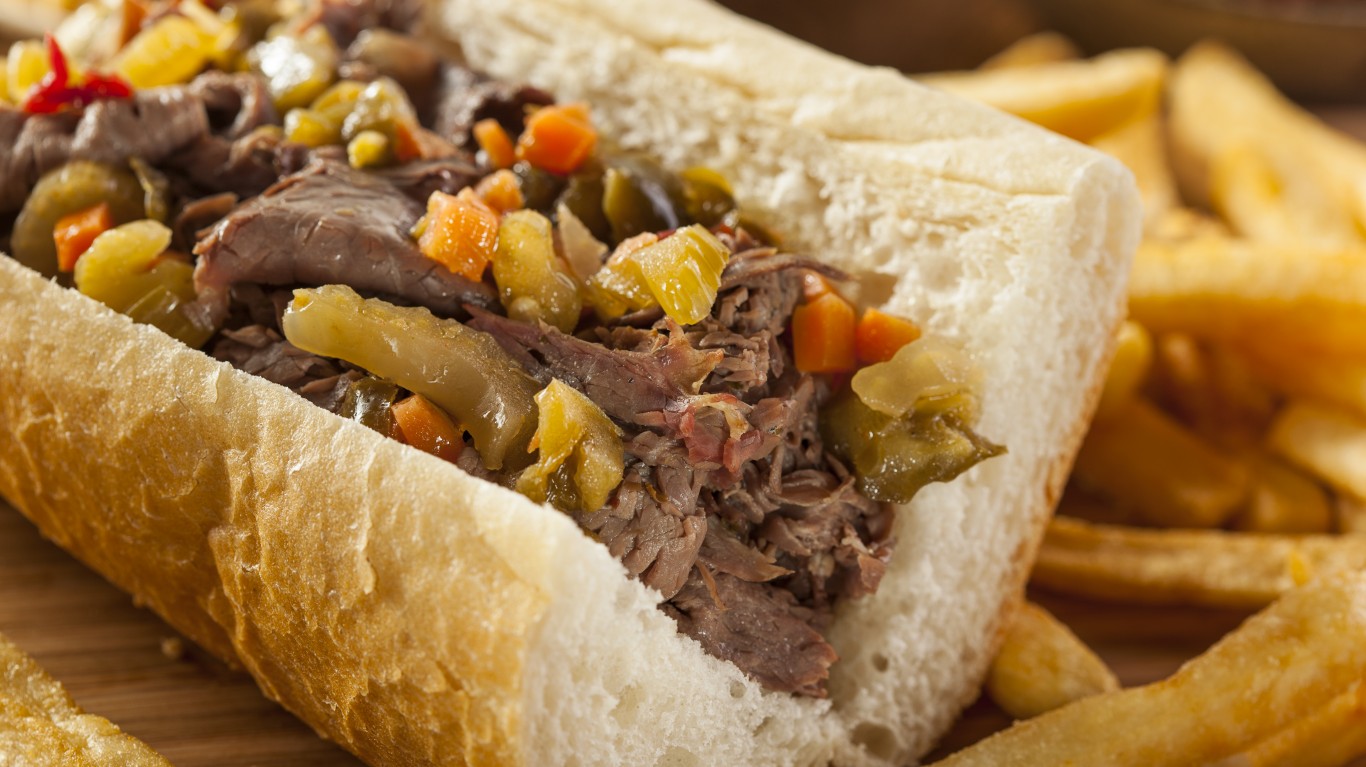
18. Italian beef
The Italian beef sandwich is a distinctly Chicagoland creation, and countless shops throughout the Windy City are serving this deliciously messy specialty. It starts with roast beef, which is sliced super-thin and simmered in au jus before being stuffed into a long French roll. The diner can customize it from here, but most opt to give the whole sandwich a dunk in the jus before topping it with giardiniera (a spicy, tangy relish made with chopped pickled vegetables) or sautéed Italian sweet peppers, and scarfing it down while hunched over a counter.
19. Beef on weck
What the Italian beef is to Chicago, beef on weck is to Buffalo. It also starts with thinly-sliced roast beef, which is piled into a special type of round roll called a kummelweck roll; it’s soft and fluffy, and topped with kosher salt and caraway seeds. The top of the bun is traditionally dipped in jus, and the roast beef is topped with horseradish. If you’re a roast beef lover and happen to find yourself in Buffalo, skip the wings and head for the nearest beef on weck.
[in-text-ad-2]
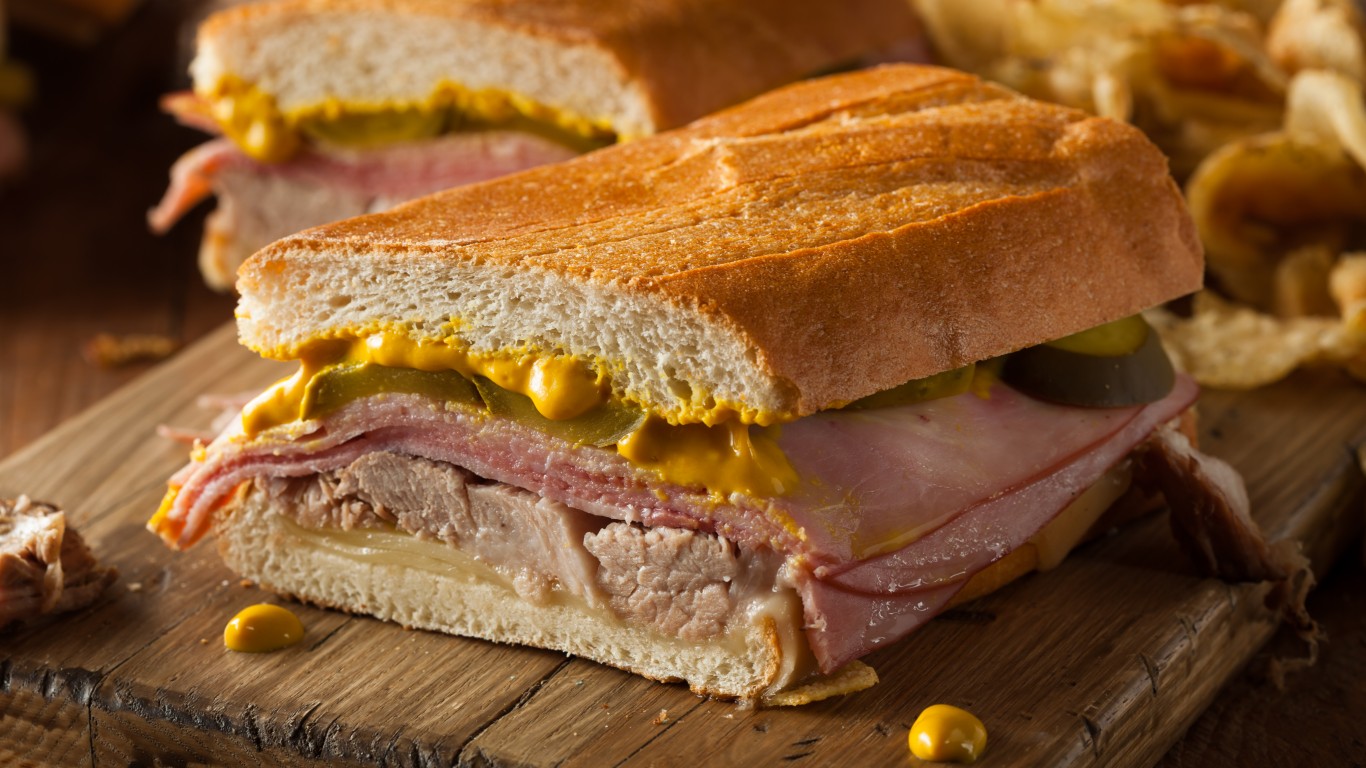
20. Cuban
Whether it was invented in Cuba or Florida is up for debate, but there’s no debating that the Cuban sandwich is one of the most delicious foods on earth. To make this meaty masterpiece, ham, roast pork, Swiss cheese, pickles, and mustard are layered onto Cuban bread and then pressed until crisp on the outside and hot and melty on the inside. It’s hugely popular in Miami, but if you order a Cuban in Tampa you’ll find that they put their own spin on it: they add salami.
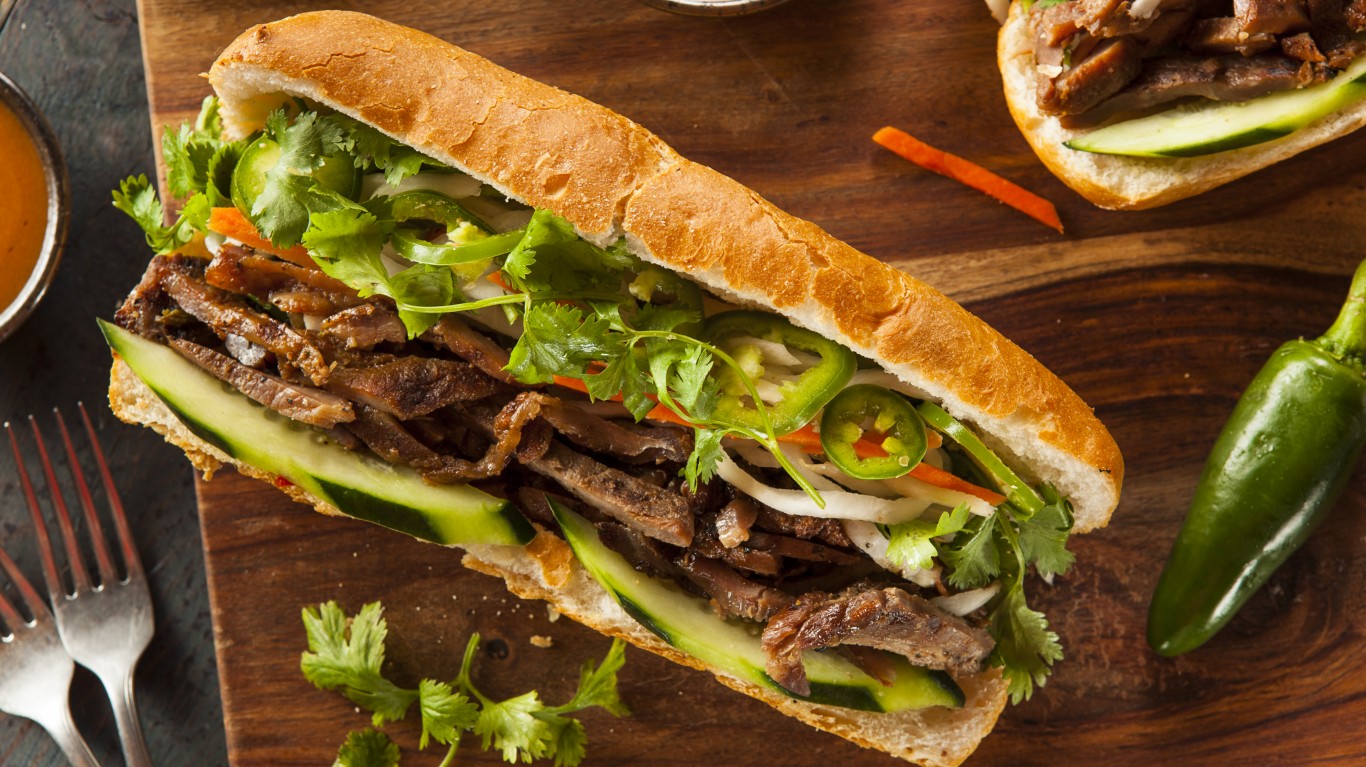
21. Bánh mì
Brought over to the United States by Vietnamese immigrants, the bánh mì is a perfect example of the influence of French imperialism in the country’s foods. It starts with a small Vietnamese baguette (which has a thinner crust and a more airy crumb than its French counterpart), and a classically filled with meats that might include ham, shredded pork, meatballs, pâté, or grilled chicken along with fresh cilantro, shredded pickled carrot and radish, and condiments including hot sauce and mayo. Most bánh mì shops offer at least 10 options for the filling.
[in-text-ad]
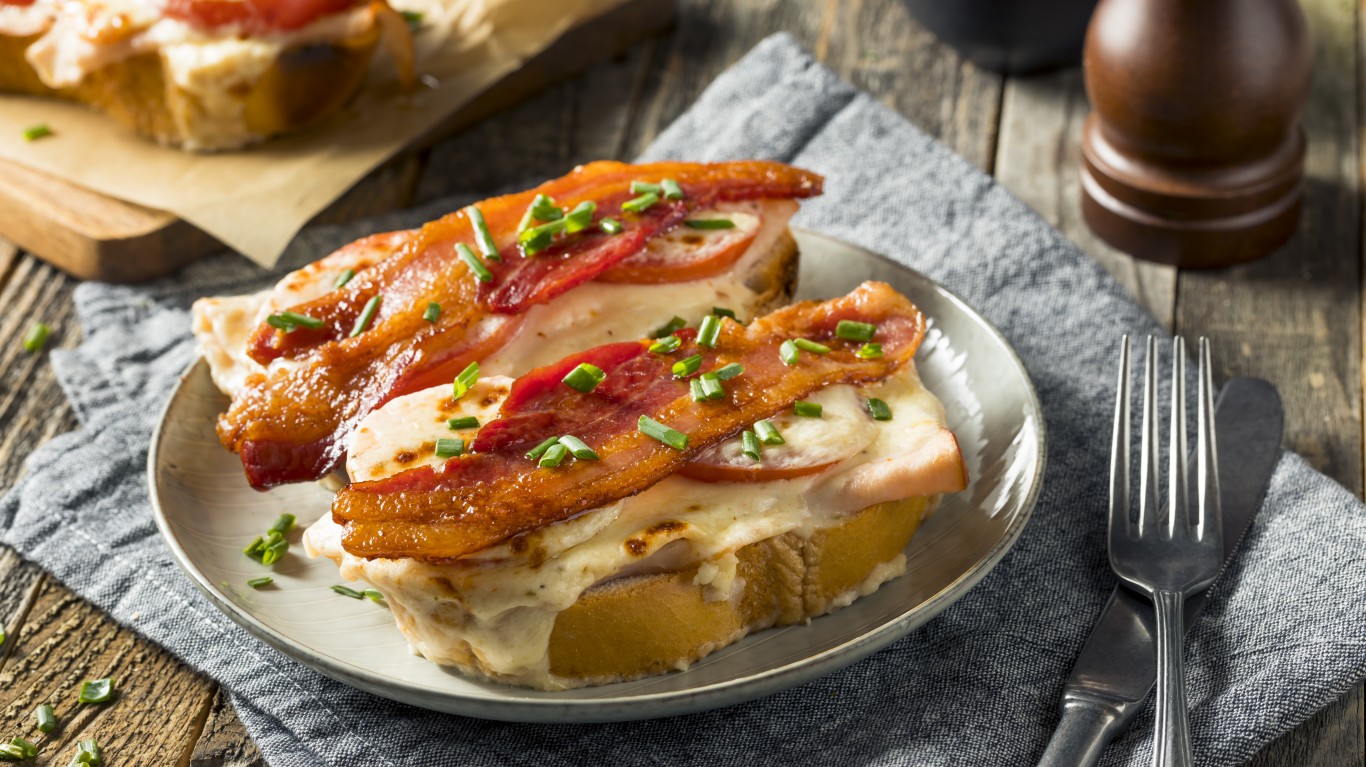
22. Hot Brown
The Hot Brown is the signature sandwich of Louisville, Kentucky, and unlike most iconic sandwiches, its origins aren’t up for debate. It was invented by chef Fred K. Schmidt at Louisville’s Brown Hotel in 1926 as a late-night dinner, and it remains the flagship menu item at the hotel to this day. To make a classic Hot Brown, sliced bread is topped with turkey, bacon, tomatoes, and a layer of cheesy mornay sauce. It’s then broiled until the bread crisps up and the top begins to brown. It’s a cheesy indulgence, and definitely makes for a great late-night snack.
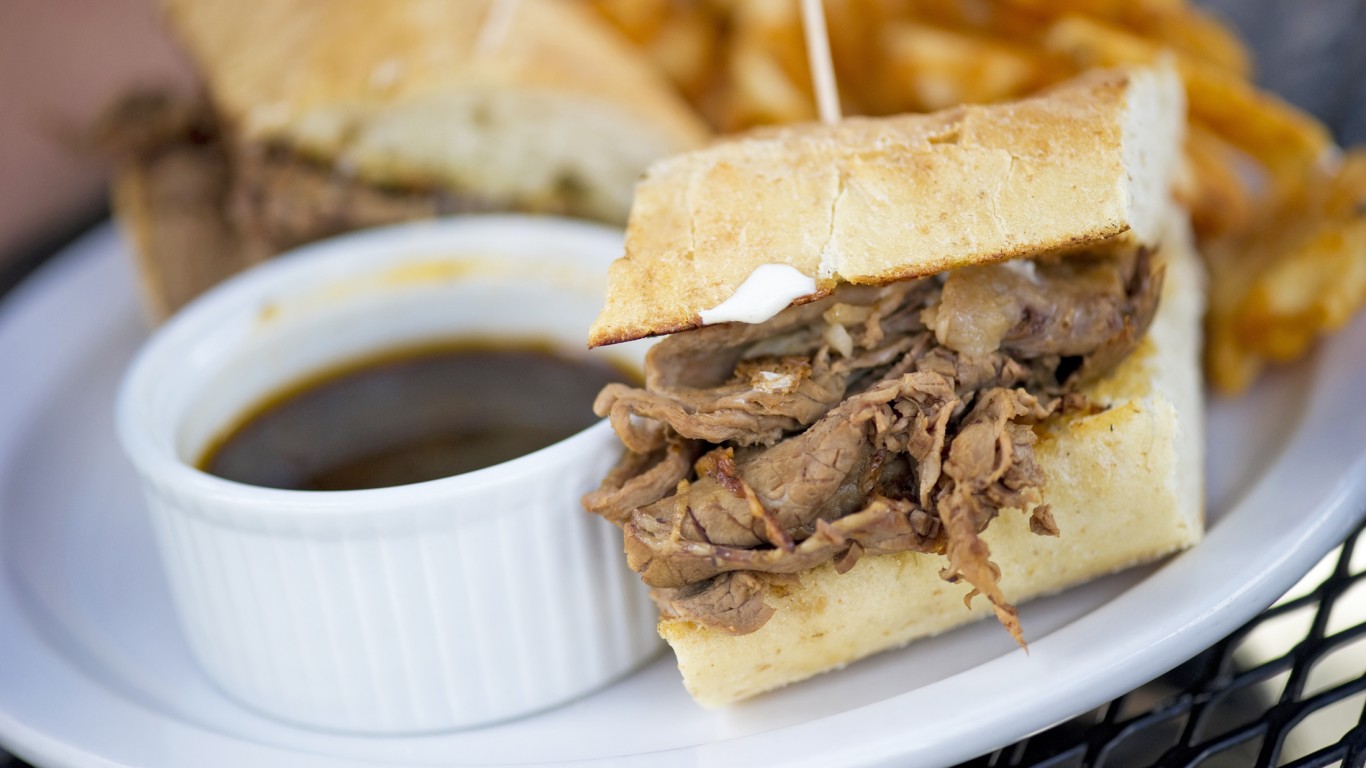
23. French dip
The French dip might be a menu mainstay nationwide these days, but it was actually invented in Los Angeles back in the early days of the 20th century. Two LA restaurants claim to have invented it — Philippe the Original and Cole’s — but regardless of its birthplace, it’s an ingenious creation. The sandwich starts with thinly-sliced hot roast beef, which is served on a French roll (hence the name). Some restaurants dunk the sandwich in beef jus before serving and others serve it with a cup of jus on the side for dunking. Both Philippe’s and Cole’s serve theirs with spicy mustard; we suggest you do the same.
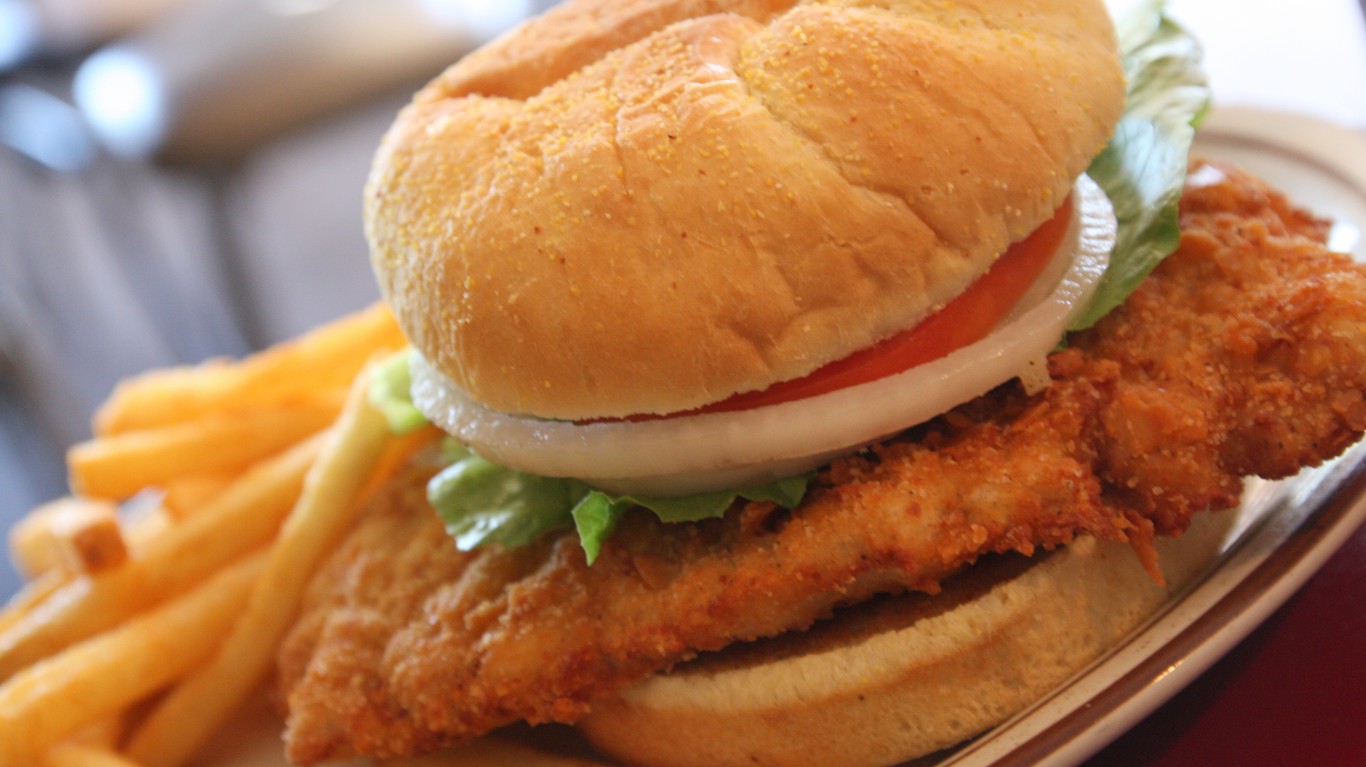
24. Fried pork tenderloin
The fried pork tenderloin sandwich is a hallmark of Midwestern cuisine, especially in Iowa, Missouri, and Indiana. It was reportedly invented at Nick’s Kitchen in Huntington, Indiana. To make this beloved regional specialty, a slice of pork loin (not tenderloin) is pounded thin, breaded with breadcrumbs or crushed saltines, and deep-fried to crispy golden-brown perfection. It’s then served on a plain hamburger bun with toppings including lettuce, onions, pickles, mustard, and ketchup. The more it overhangs the bun, the better.
[in-text-ad-2]
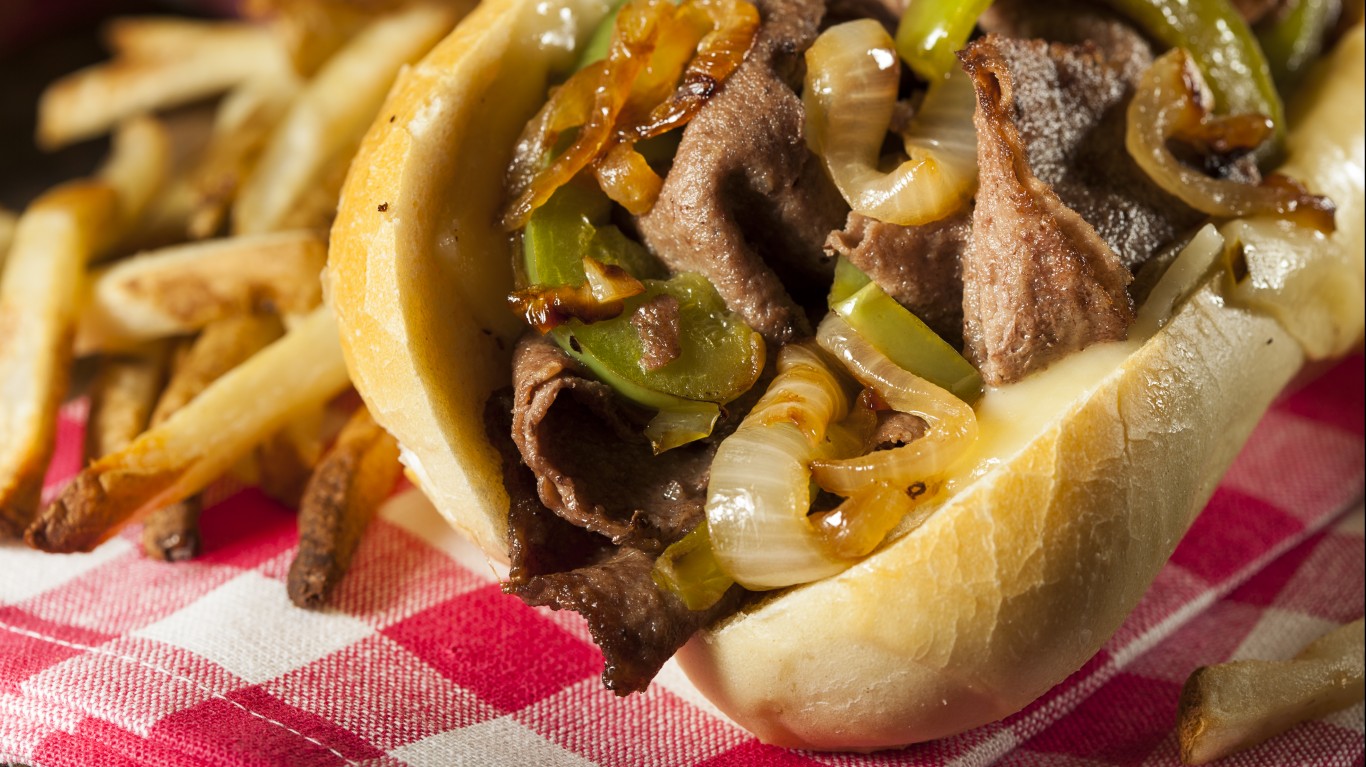
25. Philly cheesesteak
If you visit Philly without eating a cheesesteak, have you really visited Philly? A delicious gutbuster of a sandwich, the Philly cheesesteak was reportedly invented by Pat and Harry Olivieri back in the early 1930s (Pat’s remains the city’s most famous cheesesteak shop, along with Geno’s across the street). It’s a cheesy, greasy mashup of thin-sliced griddled beef, cheese (usually American, provolone, or Cheez Whiz), and chopped onions all piled into a long hoagie roll, and it’s wildly delicious.
26. Torta milanesa
The torta is a traditional Mexican sandwich, and it makes for a deliciously filling lunch. It starts with a soft roll and a wide variety of meats, and toppings usually include avocados, pickled jalapeño, lettuce, tomato, onion, refried beans, and a stringy cheese called queso Oaxaca. Protein options can range from ham to scrambled eggs, but a very popular variety is milanesa, a thinly-pounded, breaded, and fried cutlet of pork, beef, or chicken.
[in-text-ad]
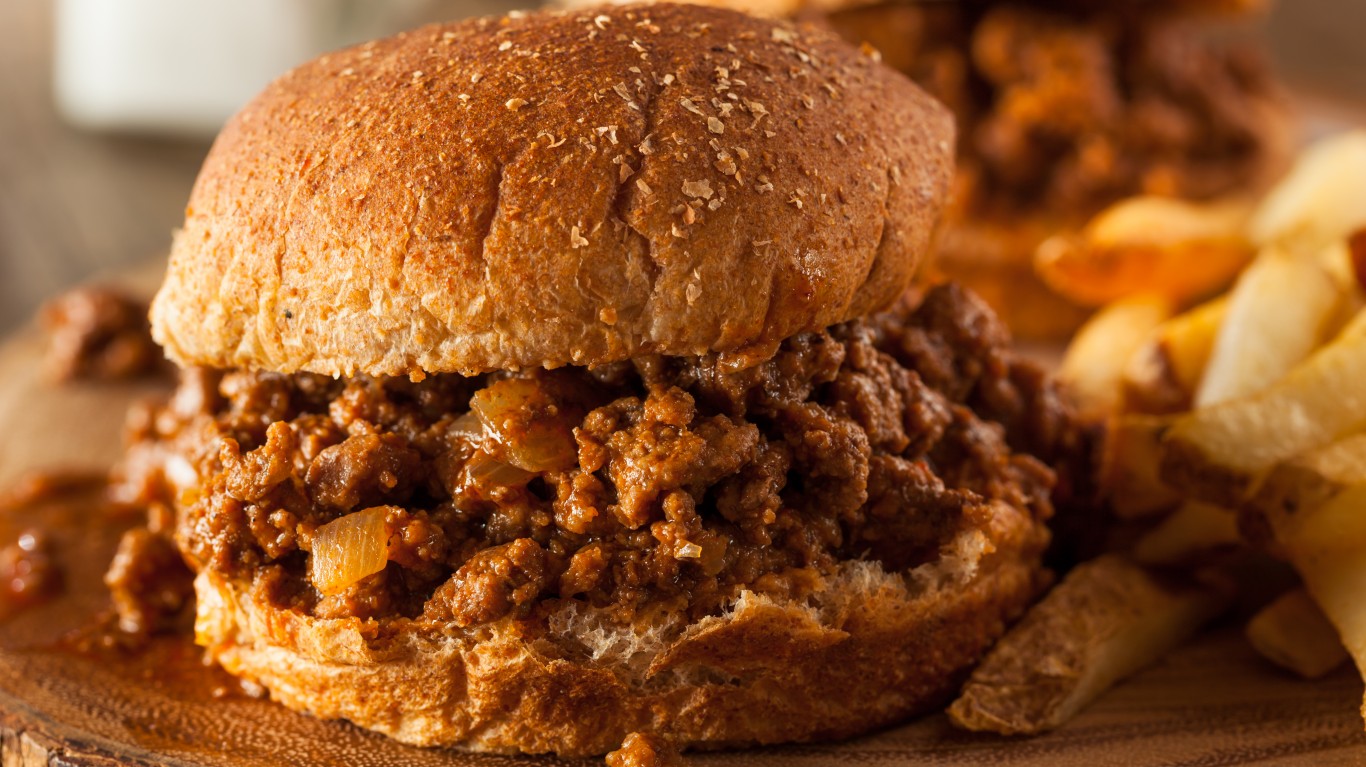
27. Sloppy Joe
A staple of school lunchrooms nationwide, the sloppy joe is made by simmering ground beef with onions and a savory tomato-based sauce, and spooning it onto a hamburger bun. It is indeed sloppy, and even though it can trace its origins to the early 20th century, it really became popular with the advent of Manwich in the late 1960s, which allowed home cooks to simply mix the canned sauce with beef to create the sandwich. In New Jersey, there’s a very different sandwich called the sloppy joe, which is made by stacking deli meats with Swiss cheese, coleslaw, and Russian dressing on three slices of rye bread.
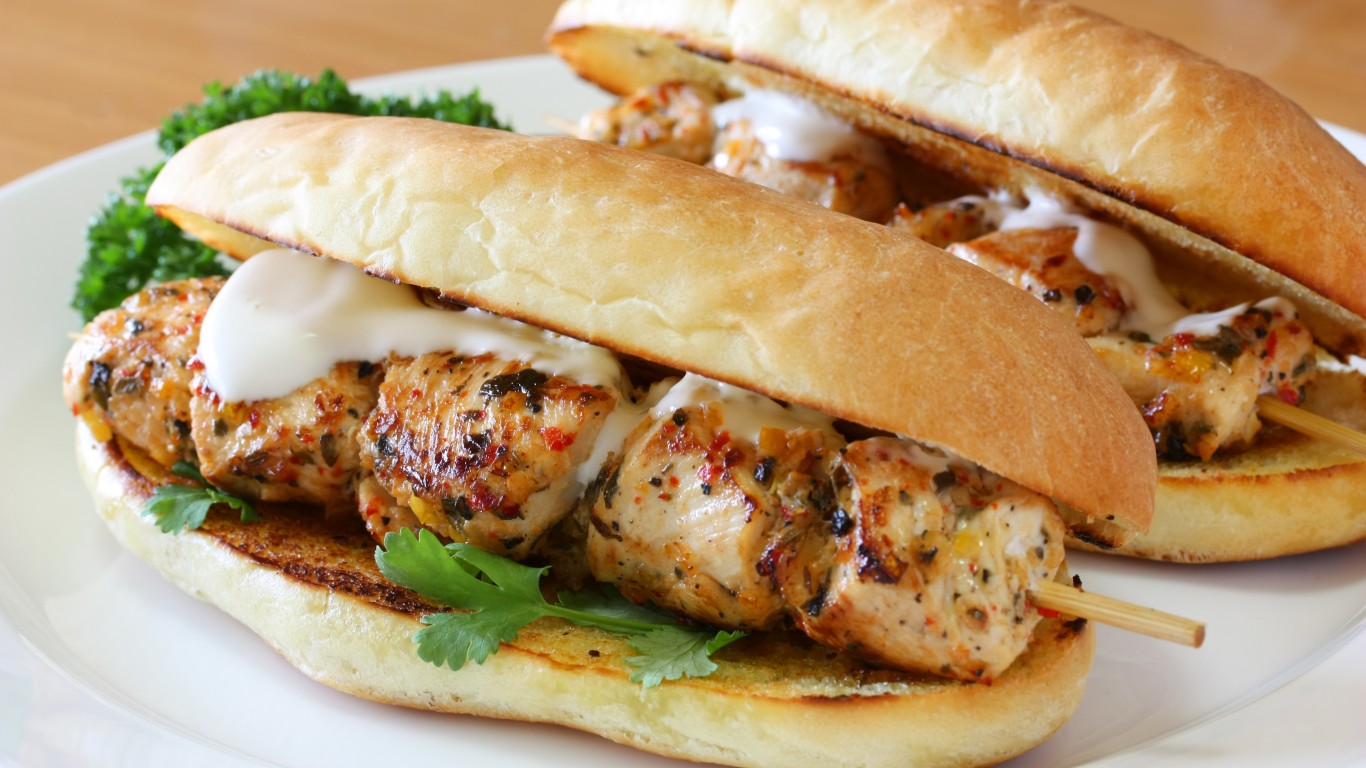
28. Spiedie
Brought by Italian immigrants to upstate New York in the 1920s and popularized in the ensuing decades, the spiedie is today one of Binghamton’s most popular foods, and there’s even an annual festival devoted to it. To make this sandwich, cubes of lamb, chicken, or beef are marinated in oil, vinegar, and Italian herbs before being charcoal-grilled and served on a soft Italian roll. It gets its name from the Italian “spiedini,” meaning skewers, on which cubes of meat can be grilled.
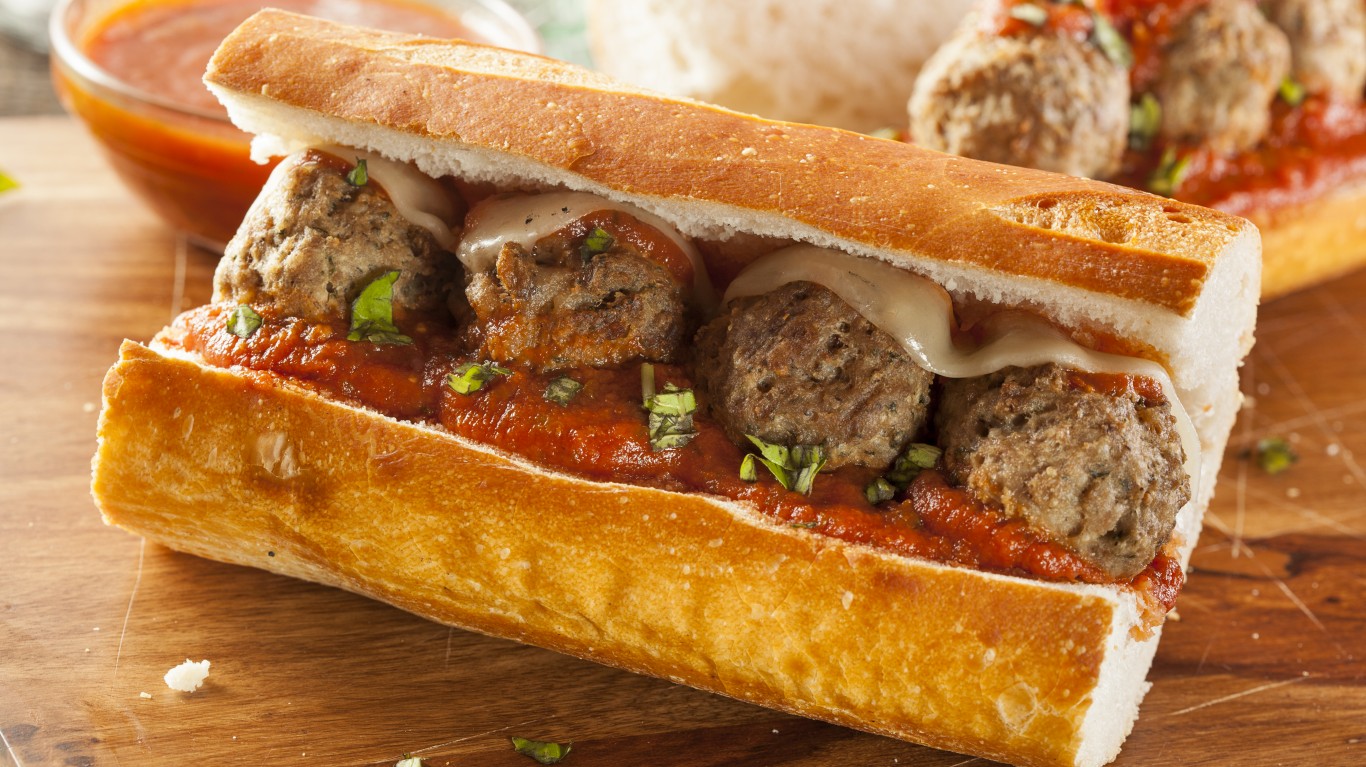
29. Meatball
In Italy, meatballs are generally eaten with only marinara sauce and a sprinkling of parmigiano. But here in the states, they’ve have found their way into countless culinary applications, including with spaghetti, on pizza, or in a sandwich. To make a meatball sub the true Italian-American way, slice meatballs in half, load them up on an Italian roll, top them with plenty of tomato sauce and mozzarella, bake it up until melty and toasty, and go to town.
[in-text-ad-2]
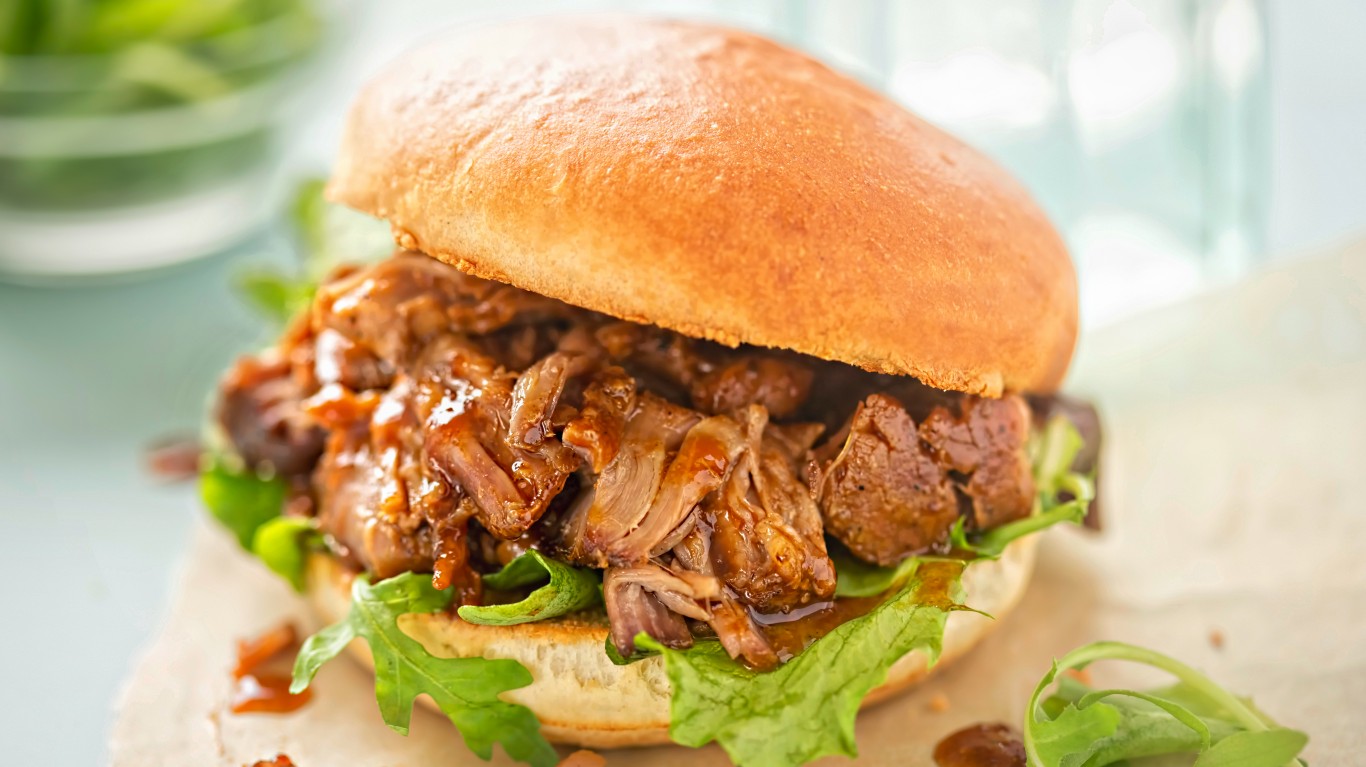
30. Pulled pork
Along with ribs and brisket, pulled pork is one of the hallmarks of barbecue, and many would argue that it’s best enjoyed in sandwich form, on a bun. Every barbecue spot has its own recipe, but they all start with pork shoulder, which is slow-smoked until falling apart before being shredded or chopped, sauced, and bunned. Sauces vary regionally; in Kansas City, for example, it’s sweet and tomato-based, and in the Carolinas it’s usually thin and vinegar-based (or mustard-based in South Carolina). Some opt to eat it straight, while others will add on coleslaw. Pulled pork is also easy to make at home (sans the smoke), especially with the help of a slow cooker or pressure cooker.
Thank you for reading! Have some feedback for us?
Contact the 24/7 Wall St. editorial team.
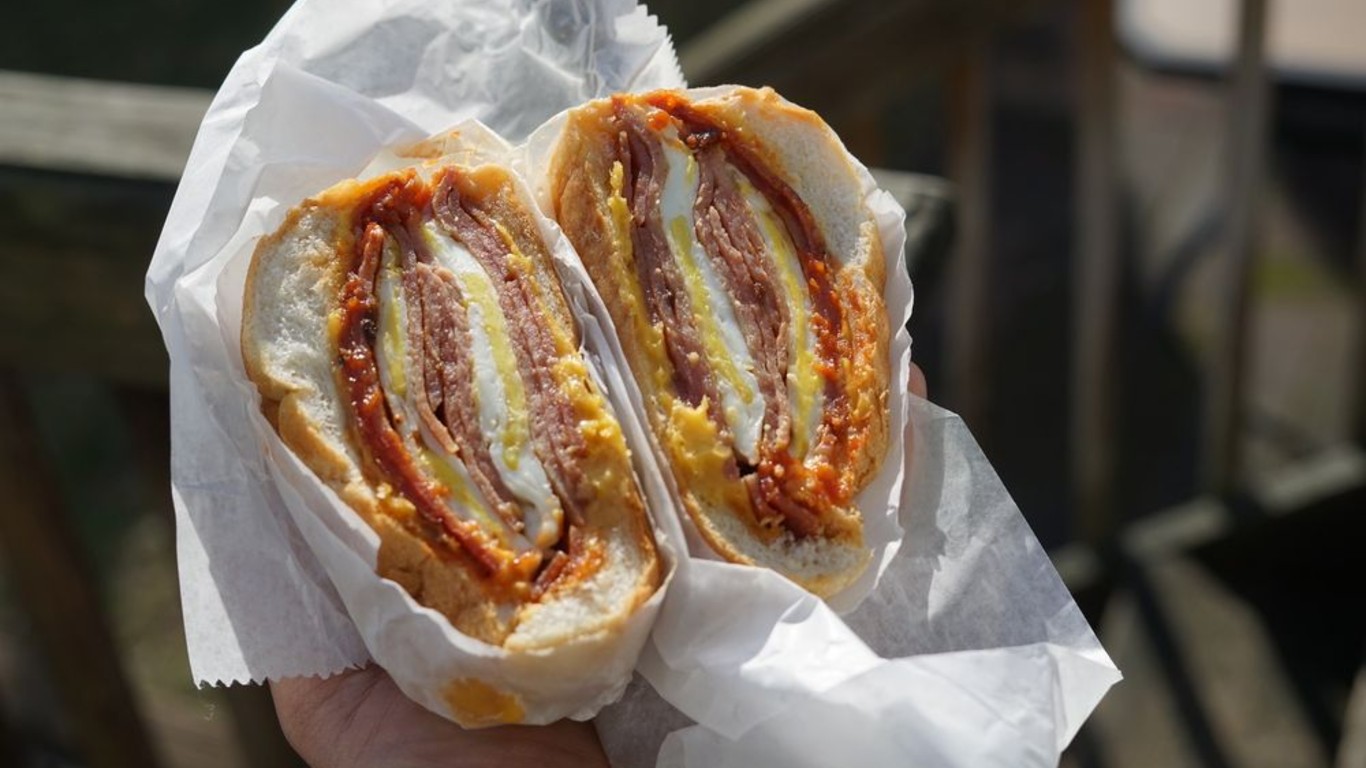 24/7 Wall St.
24/7 Wall St.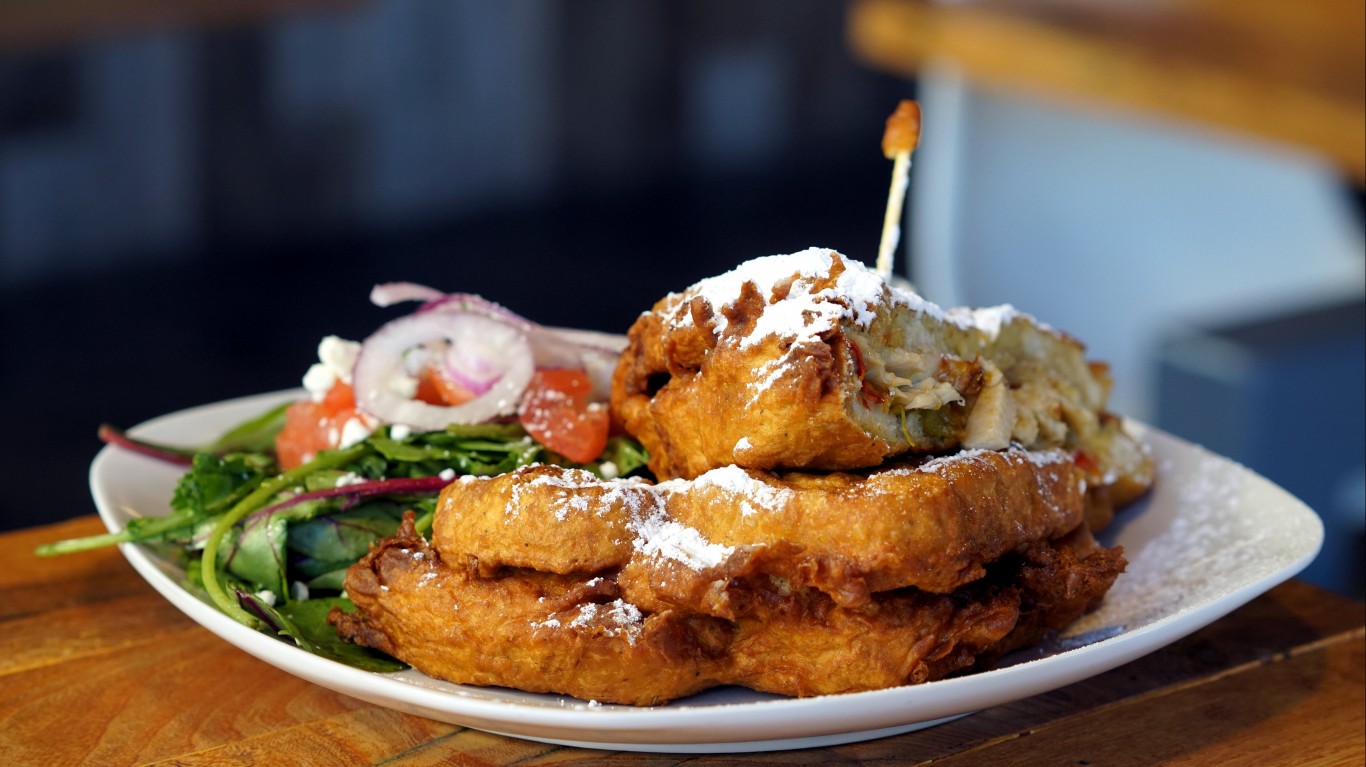
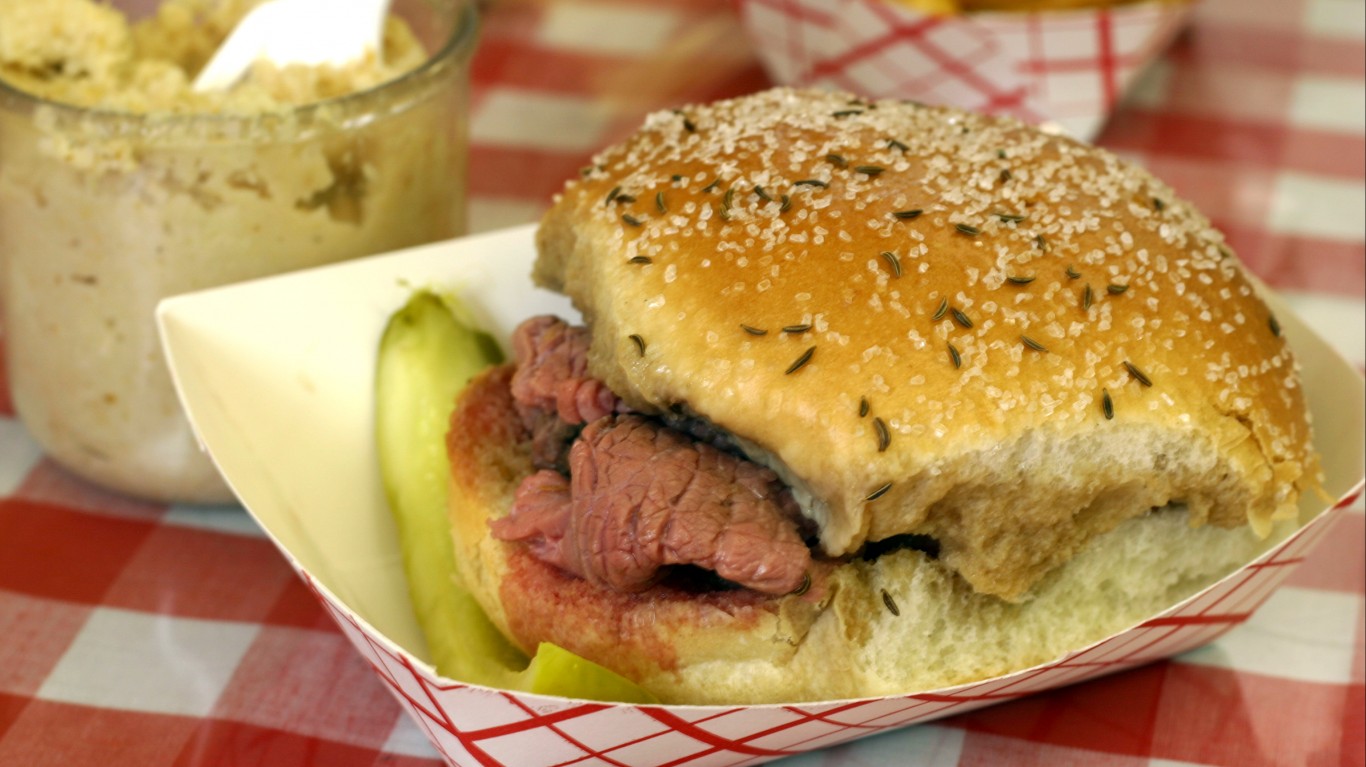
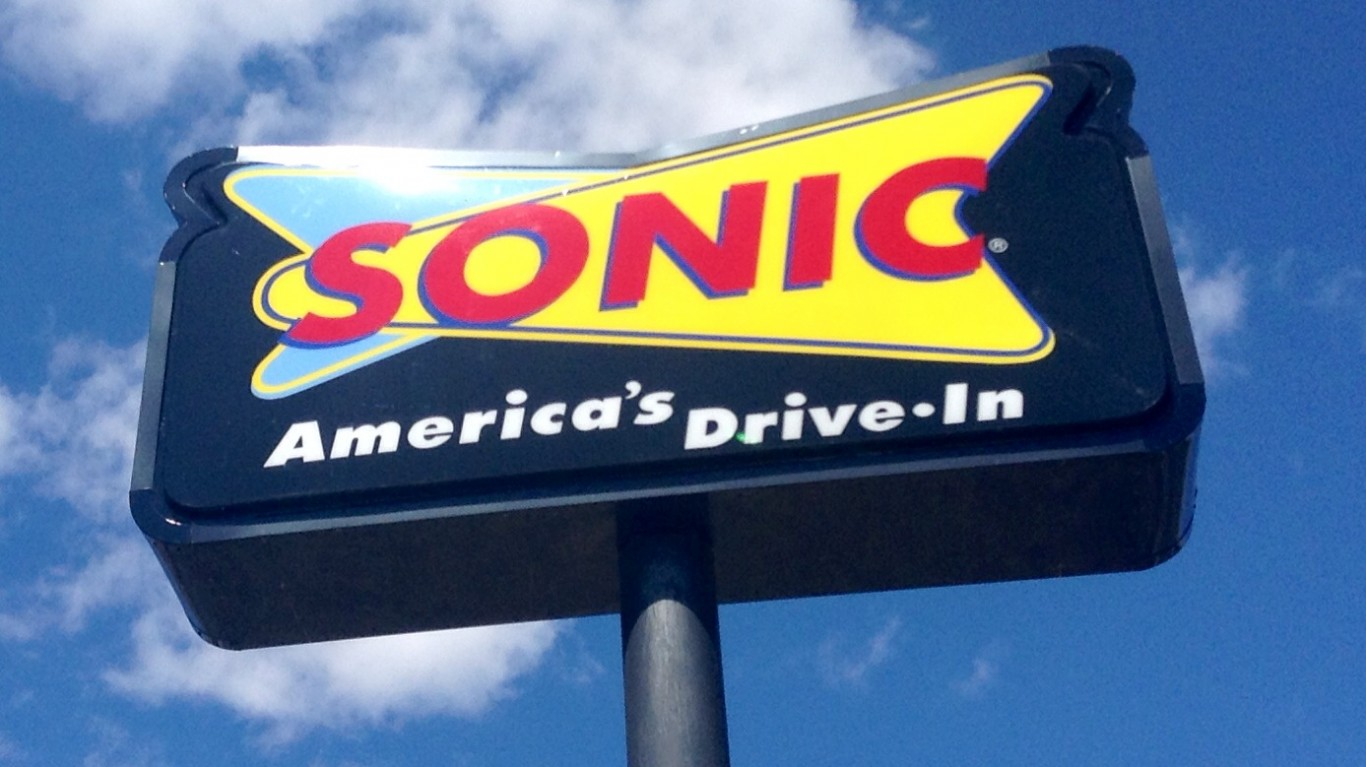 24/7 Wall St.
24/7 Wall St.